#and is not and never has been a show about demonstrating objective morality
Text
im thinking about the wire again
#p#ds9#thinking abt.. how julian is often v sensitive to what people think of him (e.g. the b plot in explorers)#but in Doctor Mode pretty horrible verbal abuse just rolls right off him#and that the lengths he goes to in it are objectively like pretty insane AND that he'd have done it for anyone#also about the notion of forgiveness wrt garak. he never said why he needed it and i imagine he never would say it#comparing it w improbable cause/the die is cast i do imagine that compassion like he mentions in one of the stories#and shows for odo has been something he's always had and struggled against to do his work#did he need forgiveness for the weakness of having it and acting on it? for not acting on it more often? for something else entirely?#one of the most interesting things about their dynamic to me is that julian knows he won't get a definitive answer there#and won't know to what degree garak worked for or against the occupation and any number of other things he'd morally condemn#(not to mention how he felt about those things as he did them not that it matters wrt making a moral judgement)#and he doesnt seem to care that much! it's an interesting point of hypocrisy#that last part is less relevant to the wire bc like julian says & demonstrates he would've done it regardless of his guilt#just thinking abt it & them more generally. bc they keep hanging out and julian talks v fondly to him in s3#garak#julian bashir
3 notes
·
View notes
Text


*LUCIUS . THE SON OF THE DEVIL .
" The devil himself told me to do it. "
⦁ Surname + First name of character : Lucius WAGNER (Lux)
⦁ Age/Birth : 13 Years old on 06/06 (2006)
⦁ Sex : Male
⦁ Race: Human - Human possessed by a demon.
⦁ Sexuality : Aromantic
⦁ Physical Description.
Lucius appears to be a very neat young boy of around thirteen. Although he can adopt any kind of outfit, he generally wears a black turtleneck t-shirt with, over it a dark red sweatshirt with “Evil” branded in black across the torso, as well as dark blue jeans with hems made at the ankles accompanying his black converse with black laces. Her hair is black, as are her eyes.
Initially, Lucius's hair was mostly wispy on the right side, but when he turned twelve, he changed it for a more sumptuous, pompadour cut with his normal hair on the right side. He has a small birthmark on the left side of his face, near his mouth. Several people who have been around Lucius note that he looks “delicate” and “fragile”, while others say they find the boy “innocent-looking”. Ironic. However, those close to Lucius (such as his former parents) seem unconsciously disconcerted or disturbed by his presence).
Physically, Lucius has the body of a human child, so he'll always have to rely on cunning and stealth. True to his father's nature, Lucius is not very comfortable with crosses, which drain all his energy and make him unable to use his powers. However, he spends his time turning them upside down so as not to be bothered again. Other sacred objects, such as the Bible and religious banners, have also been shown to affect Lucius. Since Lucius was able to defeat Isaac with the use of salt, salt may also be a weakness for him.
⦁ Moral Description
Due to his quiet nature, little is known about his personality. He can lie very well and create one for himself to convince his opponents. However, Lucius is described as having above-average scientific intelligence, as evidenced by his apprenticeship at just six years of age. Yet he appears to be a math whiz. Among other things, Lucius reveals himself to be outspoken, often making intelligent and sometimes cruelly humorous remarks about the deaths of others. Lucius is highly creative and efficient in his methods, and wastes no time in torturing his subjects. He tries to achieve his goals as quickly as possible. Demonstrating a very calm demeanor throughout all these events, Lucius is never shown in a state of panic, fear or rage. He shows great determination, as evidenced by his attempts to kill a nun while deprived of his powers. His former parents seemed to be rather reserved with the young boy, showing him no affection, no doubt because his mother suffered childbirth while giving birth to him. Despite his icy appearance, he can feel sadness.
⦁ Qualities and faults.
⦁ Perceptive.
⦁ Intelligent.
⦁ Liar.
⦁ Overconfident.
⦁ Story:
Lucius has been possessed by a demonic entity since birth, this entity only awakening from the age of 6, when he sees Lucifer in his “dreams” forcing him to commit his first murder. Learning of his infernal affiliation on June 6, 2006, Lucius embarks on a year-long race to sacrifice every member of the Wagner family in order to nurture the growth of his spiritual ancestor, Lucifer. Starting with the staff and ending with the family, Lucius accomplishes genocide by planning these “accidents” and using his supernatural powers to strengthen Lucifer's influence and instill mortal fear, while avoiding the suspicions of residents and law enforcement. At the end of the year, Lucius' power grows and he puts an end to Dante's mansion, burning it to the ground. Lucius is sent to St. Benedict's Hospital by police officers because they believe he has been “traumatized” by recent events around him. During his stay in hospital, he receives no contact from Lucifer, his powers having mysteriously disappeared since he used them. He rampages through the hospital, collecting souls to regain his strength, and also discovers the existence of another Antichrist: his half-brother Isaac Gilmore. Isaac will share the same goals as Lucius, but only one of them was meant to succeed. After finally killing Charles (in the hospital reanimation section), Lucius begins wreaking havoc in the nearby village of Ludlow. He's preparing for a battle with Isaac that will determine who is the true Son of the Devil. After killing Isaac (with salt), Lucifer gives Lucius the sacred scroll, which contains the seven seals that Lucius must break with certain actions. Lucius boards one of the evacuation buses. This is how he set off for L.A., to the nearest city, where he was put back in a hospital, remaining discreet for a good 7 years, living in the shadows of humans until he met a “new Lucifer”. Six months later, a nun is brought to the hospital and Lucius begins to attack her, forcing the staff to put him on shock therapy. When two of the staff try to shock him, he regains his powers and brutally murders them. The boy then fled the hospital . .
⦁ Telekinesis, his only power, enables him to pick up and move objects without touching them, start radios and car engines, break various objects and cause others to break (power lines, lampposts).
⦁ Relationships (family, friends, lovers, etc….)
⦁ Wagner: His fake family he killed.
⦁ Fabius Wagner; His grandfather and also the one who invoked him.
⦁ Lucifer; God etc…
2 notes
·
View notes
Note
I know this is going to be an unpopular opinion, but while I don't really think Pedro's a bad actor overall, so far I've been underwhelmed by HBO's version of Joel. They're trying so hard to play into the whole soft daddy aspect of Pedro's previous roles all because they want to make Joel more "likable". The way I knew this was going to happen when he was cast 🙄
so far it’s very interesting for me because there are some scenes where i’m like wow that was good others where i’m like. what was that.
i am enjoying the show, and i think pedro is doing pretty well but… i do agree? i’m trying to keep an open mind still but it’s like—
the crying last episode pissed me off a little. the joel in the game does not know how to identify a single emotion besides like, i dunno. protectiveness and rage?? i love that man but he is not emotionally intelligent. (the only man i love who i’d allow to be this way.)
by cutting out ALL the action i think they aren’t able to demonstrate how brutal joel can be. nothing about him in this show so far indicates to me that this man can single-handedly slaughter a whole hospital of fireflies like. it just doesn’t make sense
this version of joel is not only softer but he also can’t hold his own as well?? i like that they wanted to make him a middle aged man and not a tank and that comes with some limitations but ellie has probably saved him as many times as he’s saved her. my biggest complaint is that it seems like they’re companions because ellie doesn’t know how to travel west and has less experience. part of his considering himself a father comes with protecting her and getting protective of her. we literally don’t see that. i know they can’t have hella action scenes but i’d like at least a little bit of joel being brutal and a little unhinged bc that’s the whole point of his character—to show the lengths he’ll go to to protect her.
i’m not sure or not if the softness could be owed to pedro as a person in terms of casting, but i do agree they’ve taken away some of his gray morality. we keep hearing he killed people with tommy, killed innocents but nothing we see ever backs that up. part of what makes joel so compelling is that he’s objectively not really a good person, but he IS fundamentally human in a way that’s so relatable and logical that we forgive the literal atrocities lol
i started drafting this last week before the left behind episode but going into david next week, i think what’s going to make or break the joel thing for me is if he tortures those people trying to find where ellie is. without the torture scene i have no clue how the end will possibly make sense given what we know about him. and i really do think it’s more a thing of the script and the tv format (and only nine episodes!) not giving enough time to focus on everything much more than it is about the actors themselves (i think they’re doing pretty good, acting-wise—especially bella)
in some ways, i feel like the underwhelming feeling can some from the less drama. i get again why they can’t have too many fight scenes or whatever, but in some cases this really lowers the stakes and so it just feels less dramatic. even him getting rebar’d was so dramatic, and while i get that a normal person (not video game dads) can’t live through getting stabbed clean through, i feel like they could have still made him fall on something sharp but it’s much smaller and doesn’t go through his whole stomach? like i feel like there could have been some happy medium where it was realistic but also more dramatic and high stakes
i feel like i repeated myself a lot and i’m never good at drafting these things bc i just spit out words and don’t think about it but. i DO think it’s very enjoyable to watch, even if i think some things weren’t done quite as effectively. the way i’m thinking about it is that more than anything, this show is just a supplement to the game, as a little bonus feature. the game will still be there, as perfect and glorious as it always is.
#i have small issues with the characterization but also i feel like it’s teaching me how to let go#like whateva u know#the game is still there and it’s the most perfect thing ever#no matter what happens we’ll always have that#pedro pascal /#tlou hbo#the last of us game spoilers#tlou game spoilers#small ones#nonnies <3#frog answers#please no one start a fight with me abt this i’m not in the mood#i like discussions but don’t be abnormal#i could have written more but i’m trying to not go too long lmao#sorry this took so long to answer#i wasn’t sure when u sent it in and it’s been at least a week since i started this last week lol
33 notes
·
View notes
Note
Merry Christmas even if they were a few days back!!!! I hope you had a good time! (Dont remember if i already wished you well) Currently rereading the latest chapter because i *WILL* send my thoughts on it because both the chapter and you deserve it.
But in the meantime i had some Alicent thoughts that i needed to share with someone else apart from my bestie. So i come here and scream at your inbox with another discount analysis.
Here goes, in my mind Alicent's first time giving birth would have been really traumatizing. As easy as it might have been (in comparison to Aemma's) she was still 15?16? when she gave birth. That combined with the fact that at that time her friendly neighborhood marital rape (for the life of me i am unable to call it anything else) would have hit worse since she was still a child and it was the beginning of her miserable marriage and would have made things much more stressful and hurtful for this child's first time giving birth.
Also also in my headcanon everyone was worried about the baby and whether or not it'd be a boy. And therefore they only spared a look or a word her way when it had to do with the birth and not herself. No worries about her comfort or pain or whatnot. No encouraging words apart from the things you'd expect a farmer to whisper to his birthing cow. Just.. people treated her like a mare to be bred and like the bringer of the much awaited son [and heir (?)]. And oh boi was that a source of stress and terror for her. It must have been!
Not only did she know that the maesters wouldnt hesitate to butcher her trying to get to the Son but also if Viserys could approve of the murder of his dear and beloved wife....what would he approve of regarding her?
What would her father do? Would he even do anything? Isolated and treated as an object. And all that while she is a literal CHILD.
(I dont think my headcanon is that much far from show!reality btw and i must say once more, fuck Alicent haters. She's MY Queen treason and usurping aside. Ilhsm)
Also please let's not forget the actual physical pain and stress the labour would have put on her (underage) body. I cant stress this enough.. she was a C h i l d.
[How can some people be so hateful towards her while simultaneously crying feminist tears over Rhaenyra and her rights and hardships? Hating one of them on the grounds of this flimsy morality means not understanding or respecting either of them.]
Anyways sorry for the spam I just... I was thinking a lot about it while babysitting and having a horrible time trying to get my niece to sleep. I hope my interpretation of what we've seen on the show wasn't completely wrong and horrible.
MERRY CHRISTMAS (respectfully late I’m sorry i have no concept of time being real) TO YOU TOO BESTIE, I’m so excited to hear your thoughts on the latest chapter lmfaoooo
BUT LETS TALK ABOUT YOUR ALICENT THOUGHTS BECAUSE YOURE SO RIGHT AND I LIVE FOR THESE
Calling it martial rape is so right, viserys was really in his “gonna fuck the pain away in a hot teenager the same age as my daughter” era, and somehow managed to isolate Alicent into the role of queen that she had never anticipated before
And the birth of aegon is so loaded with aemma’s ghost and the expectations for an heir but it’s also so scary and has so much implicated for her best friend’s birthright and she really is alone for it and she’s just a baby giving birth to a baby who is in incredible pain and is so isolated b my this role that was thrust upon her
Like you said, her birthing bed was never about her, but about the consequences and implications of her rape bearing fruit, and all anyone cares about is the baby, because as she herself demonstrates, any young pretty thing can be knocked up and called queen when the prior one’s usage expiresm
And then aegon is born and she thinks that maybe, just this once, something and someone is just for her, that her child will love her unconditionally and expect nothing from her and that maybe, despite the horrific origins, being a mother can bring some direction and purpose to her life. The baby will be hers, he will love his mother and give her something to live for and just maybe it’ll be a girl who she can raise up as she would’ve wanted to be raised
EXCEPT it’s a boy
The long awaited ‘heir’
and not even aegon is really hers, because the second he’s born Otto is scheming around him and viserys is haunted even further by the fact that he killed aemma for the chance at this thing that he now has and he realizes it’s meaningless and all of alicent’s suffering for this child was for nothing
I think this plays into the way she is so hard on aegon too, she loves him of course she does, but there is that lingering resentment that aegon was the first to tear her apart and he is a physical manifestation of what viserys and Otto did to her, and he’s such a mess on top of it, it must feel like she did all this for crumbs
And she really should’ve known it would be like this, not even the perils of the birthing bed were about her, why did she expect anything different when the child was actually here, it just drives her deeper into this cold isolated place where her religion and her sacrifice are the only meanings she really has
AND YOURE RIGHT Alicent has a lot of flaws, don’t get me wrong, but so does rhaenyra! And they’re both exposed to this ruthless world where their only bargaining chips and currency are their bodies, wher e power is inherently hinged upon the men in their lives granting them a crumb of respect or autonomy, i think they parallel each other beautifully in that they made the best they could of their circumstances in the only way they could, and that different approach in a system set against them is what inevitably brings them as such interesting counters to each other
(And that’s not even touching on the homoerotic way Milly/Emma and Emily/Olivia played them!!!!)
Anyway never apologize i love hearing your analysis pls send more
#god you just get it so right every time#and I eat it up!!#these make my day#ask#hotd#Alicent Hightower
7 notes
·
View notes
Text
Arthur's Bio


" You don't get to live a bad life and have good things happen to you. "
Arthur Morgan is a cold, brooding outlaw who often resorts to violence and has very few qualms about killing. At his worst Arthur could be extremely ruthless and completely unsympathetic to the people he hurts. Despite being capable of committing such violence, Arthur does have a playful side to his personality that comes out around those he is friendly with. He isn't above joking or employing sarcasm with his friends. Notably, Arthur was kind and polite to John Marston's then-four-year-old son, Jack, having a gentle demeanor around the young boy in contrast to his threatening persona.
Despite his ability to commit great acts of violence Arthur has his own moral code and doesn't believe in what he deems as unnecessary killing, especially if it endangers himself or those he cares about. Dutch also raised Arthur to believe that revenge is a fruitless endeavor. It seems that Arthur strictly believes that violence should be cold, necessary and without feeling, never out of personal enjoyment or without reason.
Arthur cannot be bought, bullied, or intimidated, regardless of an antagonist's size, strength, wealth, or power. He is fully self-aware of his imposing nature and the effect that his own force of intimidation can have on others. Although Arthur demonstrates time after time that he fears no man, he does fear for the safety of those he cares about. Supremely confident in his ability to handle any situation or overcome any adversary, Arthur rarely shows any hesitation and will engage in combat even when outnumbered. Despite Arthur's usual bravery and calm demeanor, he does display a rare moment of fear when he confides in Sister Calderón, revealing to her that he is afraid of his own impending death as a result of his terminal illness.
In his own terms, Arthur is aware that he is a “bad man” and clearly understands that his behavior is morally wrong, though he justifies his own actions as being different from most criminals, as the Van der Linde gang carries a philosophy that Arthur genuinely believed could help people. As time went on, however, Arthur realized this philosophy was a ruse or an "excuse", as John Marston would later put it.
Arthur's degradation of faith in Dutch caused him to go through an existential crisis. Because Dutch had raised Arthur since he was a young teen, his philosophy was primarily the only thing Arthur ever believed in up until the gang’s downfall. As the gang fell apart, Arthur realized that social issues were more complex than he had ever thought and that these issues were beyond the gang's ability to control. Perhaps most disturbing to Arthur was seeing how easily Dutch could influence younger, disenfranchised men such as Eagle Flies to commit acts of violence for him. Undoubtedly this gave Arthur a new perspective on his own childhood and how Dutch had been taking advantage of him.
With his faith in Dutch and the Van der Linde gang crushed, and learning that he is terminally ill with tuberculosis, Arthur gained insight into his own feelings, opening up to Rains Fall about traumatic experiences including the death of his own son, Isaac. He also said how his terminal diagnosis made him see the world "more clearly", telling Mary Beth that the world seemed "better, almost". In the end, one of Arthur's last objectives was to protect John Marston's family and to secure Dutch’s hidden money for them in order to hopefully build a better life for themselves, making all the suffering that the gang had gone through worth something in the end. Regardless of Arthur's honor, the gang's decline, Dutch’s descent into madness, and learning of his own imminent doom, Arthur sought to secure a future for the people he cared about; a future he could never live to see but one he could guarantee.
Regarding Arthur's general attitude, he is stoic and humble, and never feels a need to prove himself to other members of the gang. Arthur has, in various forms and for various reasons, been called an "idiot" and a "fool" by others, but often brushes off these criticisms. The only person whose criticisms seemed to affect Arthur is Mary Linton, his former lover. Though he often kept his complicated, mixed feelings about his past with her to himself, Arthur quietly pondered what his life could have been like had he and Mary stayed together.
Arthur is cunning and rather intelligent, and demonstrates more self-awareness than almost everyone else in the gang, allowing him to maintain his cool demeanor, especially under pressure, and not fall under the weight of vindicating himself.
Unlike most people during the time period, Arthur is quite progressive in his views concerning women and minorities. He is seen to be disgusted by racism and has no qualms with women doing work traditionally associated with men. Regarding his religious beliefs, Arthur mentions that he's irreligious, but he does appear to believe in some form of afterlife.
6 notes
·
View notes
Text
joel getting disproportionately punished for his actions is also so fucking stupid because looking at it objectively jerry was the one to initiate this “cycle of violence.” he was the one who was going to kill ellie for reasons that may or may not be justifiable and joel’s violence in the hospital is derived from the fact that someone he loves is about to be killed and he was not willing to let that happen. it was never about the violence, it was never about the ideology, it wasn’t something done out of vengeance, it was a direct action to save ellie’s life. he kills marlene and jerry because they’ve given him reason to believe that keeping them alive will continue to be a threat to ellie’s life (he may not be fully correct in his beliefs but that’s the thought process that drives them). ellie’s whole thing in tlou2 is accepting that her actions are ultimately futile and revenge won’t bring him back, but revenge is literally the only fucking thing that motivates abby! by the time she kills joel her father has been dead for 5 years and there’s nothing rewarding or beneficial about killing joel. she hunts him down and fucking tortures him for no reason other than pure malice and for this she gets rewarded by the storyline and allowed to live because ohhh she cares for other people too i guess. the prevailing theme of tlou2 being simply that “violence is bad 🤓” is already shallow enough but showing a character who’s even less justified in her actions and demonstrates the most unnecessary violence getting to win and be forgiven by the story while the main characters who have done nothing but lose over and over get punished is so awful. it just backtracks and treads on its own fucking theme. the most that this accomplishes is vaguely saying that your actions have consequences but everyone fucking knows that! we don’t need to be spoonfed the idea that people do bad things to survive, we don’t need to be reminded every character had a family. we are given motivation to engage with the story via joel and ellie’s dynamic and the violence is used as a method of communicating how strong their bond is and how much joel doesn’t want to lose ellie. we are given narrative justification for joel’s violence. backing up on that to make some vague broad statement about morality gives the individual character motivations so much less weight and ultimately doesn’t matter because we didn’t come into tlou2 wanting to hear the stories of Everyone in the apocalypse, we came in wanting to hear more about the characters we’d grown to appreciate and care for . like . god abby’s character is such a fucking mess
0 notes
Text
𝙏𝙝𝙚 𝙉𝙚𝙬𝙨-𝘽𝙚𝙣𝙙𝙚𝙧𝙨

𝙏𝙝𝙚 𝙉𝙚𝙬𝙨-𝘽𝙚𝙣𝙙𝙚𝙧𝙨
Warning: full synopses contain 'spoilers' that give away key plot points. Don't read on if you don't want to know the ending! Robert Larkin, a successful BBC documentary film director, has an appointment with the mysterious 'JG' at the office of CWNS (Classified World News Service). CWNS operates between government and media companies, supplying news footage and stills. After detailing Larkin's career, JG reports on details of his private life, including an affair. He reveals that Larkin had been fitted with a miniature transmitter during a surgical procedure some years earlier, through which he has since been monitored. From this data, CWNS identified Larkin as being suited to working at their organization. Larkin is disbelieving and about to leave until JG plays back a recording of him in a private moment with his mistress. JG tells Larkin that he wants him to help invent new stories for 1973. JG shows Larkin through to a studio containing models and miniature film sets depicting a moon landing, scheduled for 1973. JG plays the film with commentary that they have already recorded. Elsewhere in the studio are models of an orbital weapons system and models and film of the results of a projected Chinese nuclear attack on an Indian border village. Larkin begins to realize that the public will accept the news of such remote objects and incidents of which they would never have had their own experience. Larkin is shocked to learn that the worrying new American Intercontinental Ballistic Missile 'Boy Wonder' is just a model, the story has been set up to capture his attention. JG reveals that deceptions such as these have been going on since the atomic bombing of Hiroshima and that the H bomb does not actually work. Returning to his office, JG explains that the organization thinks Larkin would be suited to working on more 'soft' news items, such as a proposed anti-teenage movement or a religious revival. JG plays a further extract from Larkin's conversation with his mistress to illustrate the qualities the organization admires in him. JG explains that since failures to develop new weapons after the Second World War, the Americans, British, and Russians have collaborated on the deception of the cold war. The Chinese follow a similar strategy and it is hoped they too will come on board. JG goes on to explain that all the crises which could lead to the deployment of these fictitious weapons are also invented and stage-managed. CWNS sits above the civil servants and the military, controlling all. Larkin is angry at this use of scare tactics and JG goes on to explain that it is not just fear but the money they use to control the population, by managing the economy. They can stimulate the economy with threatening news stories, provoking spending. He reveals that his department was also responsible for the development of LSD to counter the activities of protest movements. Larkin is incredulous to learn that higher up in the building, and therefore in the hierarchy of the organization, is a computer. JG offers Larkin a starting salary of £250,000, rising to £1 million once he reaches a position in the Ministry of Morality. Despite this, Larkin remains disgusted at the idea of CWNS and declines the job offer. As Larkin tries to leave, JG uses an example surgical transmitter to demonstrate the devices' explosive properties. He explains that it may be operated remotely. JG informs Larkin that he will be starting on Monday. BBC2's Thirty-Minute Theatre (1965-73) was an attempt to reintroduce live drama to British television at a time when most program-makers had - gratefully - put the method behind them. However, the live element didn't last long, being phased out in favor of the convenience of pre-recording. Even so, a handful of the series' plays remained live until 1968, 'The News-Benders' being one of the last. The News-Benders is directed by Rudolph Cartier, who made his name in the 1950s with ambitious live productions. The story is essentially a two-hander, performed entirely within a handful of sets but, for all its simplicity, Cartier's direction is stylish and assured. The continuity of the action is disturbed only once, with a brief cutaway shot of JG's secretary covering the actors' move from one set into another. The live production method may be backward-looking, but Desmond Lowden's script is prophetic in several respects. Although its predicted date of the moon landing significantly overshoots the reality, it strikingly pre-empts subsequent conspiracy theories which suggested the event was faked in a film studio. It also prophesies the rise of politically powerful global media organizations and the surveillance culture that inspired many later conspiracy dramas. screenonline.org.uk/tv/id/1403399 .
Donald Pleasence: Blythe 'The Forger' in The Great Escape (1963) Ernst Stavro Blofeld in You Only Live Twice (1967) Dr. Sam Loomis in the Halloween (1978)
https://www.youtube.com/watch?v=xYAke_z3RVU

Read the full article
0 notes
Text
Paving the Road to Hell
After 13.14, an episode whose title even deliberately prompts us to question the actions and choices of Team Free Will, I’ve seen a lot of backlash over the moral dubiousness of some of those choices and actions. It’s rather frustrating that the distant past is being used as a comparison for why their current moral quandaries are somehow condemnable. But Sam and Dean Winchester, going all the way back to s1, have always operated in this wide morally grey area. Even Castiel has struggled with this since the start, despite his initial conviction that his orders were just and beyond moral reproach because they came from Heaven. It took uncovering the extent of Heaven’s corruption for him to reject those orders, but even that choice didn’t come from a standpoint of Lawful Good intent. Siding with humanity (and Dean) simply became the less morally objectionable choice in Castiel’s opinion.
This goes right back to season one, and Dean telling Sam and John that he was appalled at what he was willing to do to protect them. He shot and killed what he knew to be an innocent human being possessed by a demon in order to save John and Sam in 1.22, and he didn’t regret it one bit. Tell me how objectively heroic that was?
(in the sense of “When in doubt, when none of your choices are good, save what you love,” yeah, it’s entirely understandable.)
And that’s just one instance out of hundreds. For anyone who truly believes that Sam and Dean (and now Cas, as well) haven’t always occupied this moral grey area, I invite you to rewatch the entire series. I rewatched 4.16 today, and I think this episode is a particularly excellent example of this for all three of them.
S4 had been gradually revealing the extent of Sam’s involvement with Ruby and just how “darkside” he’d gone under her tutelage. We learned right up front in 4.01 that he was lying to Dean about her and in 4.04 that he was lying to Dean about using his powers. We (and Dean) learn even more about Sam and Ruby’s relationship in 4.09, and we (but NOT Dean) learn about the blood drinking power up in 4.16. Dean only discovers that bit of trivia in 4.20, and he takes immediate steps to “detox” Sam from Ruby’s influence and the demon blood in 4.21. All of that fails because Cas frees Sam on Heaven’s orders, but the big dramatic irony of the entire season was that they’d all been lied to and manipulated into doing exactly what Heaven (and Hell) wanted them to do.
They were told all along that they needed to kill Lilith because she would start the apocalypse, when all along KILLING LILITH was the key to freeing Lucifer and STARTING the apocalypse. All their fraught moral compromises were for naught, their squabbles over who was strong enough or destined to kill Lilith were a distraction. The entirety of s4 was about setting the board for the actual prize fight in s5.
Knowing the futility of all their actions through the power of Hindsight™, it makes their moral corruption (Sam’s conviction that his self-sacrifice was for the greater good, and Dean’s conviction that Heaven’s path to killing Lilith was morally just) is where the dramatic irony of the entire season comes to a head.
But let’s explore some of their morally questionable choices and actions just from within the context of a single episode, and specifically a single episode that directly addresses what is right and what is objectively wrong, and pits them against their current beliefs and their good intentions.
The episode begins with a woman in white, lying dead on the ground as car alarms blare. That was the episode’s version of the Kill Bill Siren going off here. Cas silences the alarms-- ignores the alarms, essentially, over his sister’s body. He disappears in a flap of wings as we see the dead angel’s wings imprinted in charcoal on the ground.
What he doesn’t know, but will by the end of the episode, is that her murder was arranged to convince him to agree to support Uriel’s “orders,” to recruit Dean to torture Alastair. The entire situation was a setup to further Heaven’s corrupt agenda, to keep Dean under their thumb, to encourage Sam to continue his self-corruption drinking Ruby’s blood in preparation to kill Lilith as it was prophesied.
In this episode, Anna was the wild card. Her position as a fugitive from Heaven, who’d rebelled against her orders, who cared so much for humanity that she’d fallen and become human and only recovered her grace to save her own life and continue working to undermine Heaven’s agenda, allowed her to act as both the metaphorical angel on Cas’s shoulder, as well as his literal savior.
At the beginning of the episode, Sam and Dean are returning from Pamela’s funeral. Yet another character killed because they thought they were doing the right thing asking for her help. Saving a seal was more urgent, so they brought her in to help despite her clear objections in 4.15:
Pamela: Yeah, I do. And guess what? I'm sick of being hauled back into your angel-demon, Soc-Greaser crap.
She also delivered the coup de grace of this entire point leading into 4.16. As she lay dying because she’d agreed to help and been caught up in the line of fire, she whispers this warning in Sam’s ear:
Pamela: I know what you did to that demon, Sam. I can feel what's inside of you. If you think you have good intentions, think again.
But of course he doesn’t… his inability to save Pamela only drives him further into Ruby’s confidence, doubling down on making himself “stronger” by drinking her blood and intensifying his psychic powers. But Pamela’s dying words, now made the title of 13.14, set up some of the biggest examples of Good Intentions paving superhighways to Hell.
While torturing the demon who’d literally trained Dean to torture, put into this position by angels of Heaven, Dean learns that his own personal self-ruination through his moment of weakness in Hell had been the singular act that broke the first seal and ushered in the apocalypse. Talk about a demoralizing blow.
Cas fought against what he’d always believed was wrong. He may have doubted Heaven’s orders, but Anna’s suggestion that they were on the same side was a bridge too far for him to cross yet. At first he was receptive to her council that forcing Dean to torture was wrong, because he felt similarly ambivalent, until she implied they could work together… his doubts continued, but it took Dean breaking again, and the further uncovering of evidence that Uriel (and possibly Heaven in general) were at the very least working against the general good:
Castiel: Lucifer is not God.
Uriel: God isn't God anymore. He doesn't care what we do. I am proof of that.
Cas continues to struggle with what is right, with whom to trust, and what lengths he’s willing to go to, how much of his loyalty to Heaven is deserved:
ANNA: What do you want from me, Castiel?
CASTIEL: I'm considering disobedience.
ANNA: Good.
CASTIEL: No, it isn't. For the first time, I feel...
ANNA: It gets worse. Choosing your own course of action is confusing, terrifying.
ANNA puts her hand on CASTIEL's shoulder. He looks at it; she drops it.
ANNA: That's right. You're too good for my help. I'm just trash. A walking blasphemy.
CASTIEL: Anna. I don't know what to do. Please tell me what to do.
ANNA: Like the old days? No. I'm sorry. It's time to think for yourself.
Meanwhile, when Dean is taken away to torture Alastair, Sam’s first move is to call on Ruby for help. She not only locates Dean for him, but reinforces Sam’s dependence on her and his belief that drinking her blood will make him more powerful. When Sam eventually arrives to find Dean unconscious and beaten by Alastair, who’s on the verge of defeating Castiel as well, and he uses the demonically-given powers that Uriel and Castiel-- not to mention Dean-- had been warning him off of all season long to literally save the day. Talk about positive reinforcement of a massive objectively Morally Negative behavior, you know?
Cas stands appalled when Sam proudly tells Alastair that he’s become strong enough to kill with his powers, and then proves it by killing Alastair.
The thing is, based on the information they had at the time, ALL of their actions seemed morally justifiable. They had goals they’d established in the name of the good of the entire world. Their INTENTIONS were GOOD. And they literally paved the road to Hell by the end of the season.
So, no, the entire fandom hasn’t suddenly flipped our collective morality in justifying any of their actions in season 13. We as the audience are being given more information upfront this time around, underscoring the dramatic irony of some of their objectively morally grey choices, but the characters’ beliefs that they’re all acting with Good Intentions is easier to deconstruct when we have more of the puzzle pieces to work with than we did in s4 (or s6, or s8 for that matter…).
We’re not being show a more morally corrupt or objectively shady version of TFW. We’re just in on the season’s irony so that we can see their good intentions go so horribly wrong in real time instead of only with the benefit of hindsight.
I’m just really tired of holding up s13 TFW up against past seasons and refusing to recall just how bad most of their intentions have gone in the past.
#spn 4.16#spn 4.15#s13 meta rewatch#spn 13.14#dramatic irony is the the magnetic force holding all of s13 together#can we PLEASE stop looking at the past through rose colored glasses?#supernatural has never presented our heroes as objectively morally correct and good#they've always made morally debatable choices but they've also never really been faced with any objectively GOOD choices either#even the revelation of Dean's fated role as the Righteous Man who will stop the apocalypse is mired in moral quandaries#from the fact it was the demon that corrupted him in Hell who gave him that title#to the fact that HE WAS CORRUPTED IN HELL IN ORDER TO EARN THE TITLE... i mean...#tell me how any of that's morally upstanding or commendable?#you're watching supernatural... which is a HORROR show in case anyone forgot#and is not and never has been a show about demonstrating objective morality
55 notes
·
View notes
Text
HP FESTS: DramioneFanfictionWriters (Part 4)
DFW's Deal or No Deal: Famous Shakespeare Lines, February 2021:
Short Life For A Daffodil by KrysKrossZee - T, one-shot - Hermione and Draco have a wild daughter who likes to pull up daffodils and frustrate her parents, but the duo wouldn't be without their children.
Friends Dont by Lostinthenightrain - T, one-shot - "You don’t choose who you fall for!” “No, because I sure as hell wouldn’t be standing here now would I?” Hermione mourns the loss of a relationship.
The Malfoy Mistress by ThebeMoon - M, one-shot - Unable to bear the sight of Bellatrix carving into Hermione Granger at Malfoy Manor, Draco Malfoy whisks his hated former schoolmate to safety. He should have known better.
Rules of Engagement by Art3misiA - T, one-shot - Lucius just had to be difficult about the idea of Draco and Hermione getting married. Will Draco and Hermione allow him to throw his weight around, or will they bring him to heel?
DFW's Deal or No Deal: Popular 90's TV Shows, March 2021:
The Death of Theo Nott by Lostinthenightrain - T, one-shot - “Hermione.” Her head whipped up to see the broken expression in Draco’s eyes. “He wouldn’t kill himself.”
The Night of the Rats by rennaissance_woman - not rated, one-shot - What happens when a prank war goes too far?
Perfect Harmony by Talonwillow (TalonWillow) - T, one-shot -Professor Slughorn's star Potions pupil Hermione was tired of being the ugly duckling, so she created a potion that would transform her into a beautiful swan. Everyone seemed to like the shiny new version of her... Well, except for herself and maybe one other. Would Draco Malfoy convince her that what everyone else was seeing was what he saw every day, and would Hermione finally be able to live in Perfect Harmony?
Dramione Go Star Trekking by KrysKrossZee - T, one-shot -
Riker has made a pass at Hermione and she doesn't quite know how to deal with it.
Bloody Colonials by Maira - T, one-shot - Hermione Granger has had a long week, and the last thing she wants to do is leave the comfort of her home. But when her best friend asks for her help in dealing with a possible cursed object, what can she do but help?
Brownies, Potion-making robe etiquette, and a cursed Nigerian mask all add up to a typical night at Hogwarts. Written for the DFW's Deal or No Deal challenge.
The Latest Teenage Drama by Art3misiA - T, one-shot - Teenagers. Gotta love em. Teenage dramas? Not so much. Draco and Hermione navigate the perils of unwanted teenage behaviour - 90s family sitcom style.
DFW's Deal or No Deal: Around the World, April 2021:
The Assignment by Art3misiA - G, one-shot - Hermione and Draco, Aurors, have been sent to Cape Town on a top secret assignment - to track down a former Death Eater.
Finding Them by KrysKrossZee - T, WIP - After not finding her parents in Austrailia, Hermione enlists Draco's help and the two make their way to Vancouver when they have a new lead.
DFW's Deal or No Deal: The Language of Flowers, May 2021:
Spilled Ink by Maira - M, one-shot - It's nearly Christmas, and things aren't great. Draco Malfoy is still on house arrest due to the Wizengamot being a bag of dicks. Hermione Granger is out of the country on a job, which means he won't see her for a few weeks.
And to top it all off, Hermione has sent Draco a plant. A green, spiky plant, for no reason that he can fathom. Oh, and a spelled journal that he's now supposed to write in. Because nothing could possibly go wrong with that plan. Written for the DFW Deal or No Deal Challenge!
Forever by Art3misiA - M, one-shot - Though they may be gone, our memories of them remain forever.
The Little Things by KrysKrossZee - T, one-shot - When Hermione buys Draco a cup of coffee and leaves it on his desk, it throws Draco through a loop and he wonders what he should get her in exchange.
The Climbing Vine by rennaissance_woman - not rated, one-shot - After receiving some startling news, Draco runs out of the house. He receives some advice from a surprising source.
Changing of the Seasons by Lostinthenightrain - M, one-shot - Hermione & Draco find a local park and two unlikely faces to greet them.
DFW's Deal or No Deal: Draco's Birthday Soundtrack, June 2021:
Straight to the Heart by AdAsttra - T, one-shot - Draco's ready to tell Hermione how he feels, but Cupid has other ideas.
Stick Around by KrysKrossZee - T, one-shot - Hermione doesn't know why Draco is the only one who makes her feel safe, but she is glad that she is able to get some reprieve from her brain.
Wild and Wired by Maira - M, one-shot - Need your lovin' here beside me, Need it close enough to guide me, I've been hopin' you would find me, You're the biggest part of me. - Hermione was expecting a fun night out with her boyfriend and her friends. She was not expecting ice cubes, sick ponies, and a serenade beautiful enough to melt her heart. Written for the DFW's Deal or No Deal challenge.
Let's Get Serious (Please, for the Love of Merlin!) by Art3misiA - G, one-shot - Draco wants to get serious, but Hermione isn't so sure. Will their opposing views make or break them?
DFW's Deal or No Deal: Magical Monsters, July 2021:
There's A Zouwu In My Basement by KrysKrossZee - T, one-shot - When a creature has broken into the Malfoy Manor dungeon, Draco has to call for help.
Miseria by crochetaway - T, one-shot - Hermione tames a Dementor.
Aegis by Maira - M, one-shot - Their world is in ruins, and their only protection against creatures wanting to kill them is about to fall. They make a plan to trek across the country to Hogwarts, where others have gathered to make a new home within the castle. There, they will be safe. One problem - before they go, there's a queen to kill. Written for the DFW's Deal or No Deal Challenge.
Fear & Desire by myladymay - T, one-shot - Draco Malfoy wants to change his life. He returns to Hogwarts for Eighth Year and finds himself confronted with both his biggest fear and greatest desire, all wrapped up in a Gryffindor tie.
Innocent Monsters by itscometothis - T, 12 chapters - Draco Malfoy thought he had reasonable expectations for his mandatory Eighth Year at Hogwarts, where he would be confined to the grounds as part of his probation. Isolation, hatred, and passing his NEWTs were really all he had in mind. What he wasn't anticipating:
1) Having a small firstie latch onto him like a bloody koala
2) Said firstie adopting an erkling as if they didn’t feed on children.
To protect his little nuisance, he’ll have to seek help from uncomfortable places, including the Swottiest Witch of Her Age. Joy of all joys.
Transformed by Art3misiA - T, one-shot - Draco and Charlie have a dragon to catch, and time is running out. Meanwhile, Hermione is missing, adding to Draco's woes.
DFW's Deal or No Deal: Legendary Duos, August 2021:
Three's a crowd, four's trouble by AnnaRitaLi - M, WIP - p>My sister is right. My life did change that evening. I just don't think Rosalind meant for me to steal her boyfriend, or I don't think I stole him, Draco, not precisely. You cannot steal something that doesn't want to be whisked away. That's my experience, at least, and I've stolen quite a few things over the years. So I can say this with confidence. You can't lose something you never had. But you’ll have to read it in the book, dear. While the Crown doesn’t wish for me to speak out in public, I have been silent for too long. You see, There were three of us in this marriage. And people, the press, have assumed many things over the years about Draco and me. So this book, as you’ll see, it’s my attempt to set the record straight. Yes, there were three of us in this marriage, but there were also much more going on than that. -- This is the story the Crown never wanted to get out. In other words, I bring you the x-rated version of the book ‘Diana - her true story - in her own words’.’ It’s the Dramione as Charles & Diana AU you didn't know you needed.
The Marquess and the Kitchen Girl by Art3misiA - E, 8 chapters - Draco Malfoy is the son of the most powerful Duke in Wiltshire. One day, he will be the ruler of a large duchy. Hermione Granger lives happily with her parents - that is, until tragedy strikes. Two children will become friends, and gradually discover a forbidden love that seems as if it might one day defy the odds. Alas, this is a tale of doomed lovers.
In Her Arms by KrysKrossZee - M, one-shot - Draco's worked his way up through Voldemort's ranks but it would seem that all of his work has been for nothing when Dolohov captures a new prisoner.
The Happiness I Seek by Maira - M, one-shot - To those without a soulmate, the world is devoid of colour. They say that if you are lucky enough to meet your soulmate, everything changes. The world is brighter, food is richer, and you find a love you never knew you needed. Draco Malfoy has never been lucky. Written for the DFW's Deal or No Deal challenge.
darling! by itscometothis - M, one-shot - When Draco and Hermione are invited to help demonstrate a path forward for Wizarding Britain and its reconciliation, neither really feel like they can refuse - Hermione for moral reasons and Draco for practical ones (read: Azkaban sounds bad). But they have very different ideas on how to play up this fake relationship. Written for DFW's Deal or No Deal: Legendary Duos - Kermit and Ms. Piggy. It's as ridiculous as you expect.
A Thousand Ships by floorcoaster - M, WIP - Draco Malfoy knows what he wants, and he's not afraid to reach out and take it.
Quiet My Demons by Lostinthenightrain - M, one-shot - “Unhappy, darling?” He murmured, his cigar placed on its resting dish, dashed out - a little puff of smoke rising into the air between them before disappearing. “Yes, completely.”
I Love Draco by crochetaway - G, one-shot - A few slice of life scenes with Hermione, Draco, and Scorpius ala I Love Lucy style!
DFW's Deal or No Deal: The Final Word, September 2021:
Crime & Punishment by itscometothis - T, 12 chapters - TRIAL TRANSCRIPT OF DRACO LUCIUS MALFOY DRACO LUCIUS MALFOY IS FORMALLY CHARGED WITH THE FOLLOWING: CONSPIRACY TO COMMIT MURDER AIDING AND ABETTING A MURDER USE OF UNFORGIVABLE CURSES: IMPERIUS (2 COUNTS) USE OF UNFORGIVABLE CURSES: CRUCIATUS (47 COUNTS) PARTICIPATING IN A TERRORIST ORGANIZATION -- I don’t regret hoping. I thought I might, at the beginning, do you remember? But I don’t. I regret nothing about you, my love. Eternally yours, Draco -- A story of hope, punishment, and the nature of justice told in trial transcripts, visits in an interrogation room, and letters.
Boats Against the Current by AlannaTCooper - T, one-shot - Draco Malfoy is trying to escape his past by running as far away as he can. But the past - and his nightmares - keep pulling him backwards.
By His Side by KrysKrossZee - T, one-shot - Hermione is lonely but there's at least one person who can break through her loneliness.
Trying To Live by IzzieStellar - T, one-shot - After her husband dies, Hermione can’t seem to remember how to live and her friends vow to help her.
In the Dead of Night by AdAsttra - G, one-shot - Hermione and Draco are some of the last people to leave Hogwarts under the veil of a cold, dark night.
This fest is ongoing.
95 notes
·
View notes
Note
oh man i have a Lot of thoughts about the autopsy of jane doe, both positive and critical For Sure, i'd be SO excited to see your analysis of it! definitely keeping an eye out for that 👀
thanks! i'm working on something article-like to talk about the film and i don't know what i want to do with it yet lol but if i don't post it on here i'll definitely link it. it's mainly a discussion of gender in possession/occult films in the same way that carol clover describes in men, women, and chainsaws - that there are dual plot lines in occult films, usually gendered masculine and feminine respectively, where the "main" feminine plot (the actual possession) is actually a way to explore the "real" masculine plot (the emotional conflict of the "man in crisis" protagonist). typically the man in crisis is too masculine, or "closed" emotionally, where the woman is too "open," which is why she acts as the vehicle for the supernatural occurrence as well as the core emotions of the film. the man has to learn how to become more open (though if he becomes too open, like father karras in the exorcist, he has to die by the end - he has to find a happy medium, where he doesn't actually transgress gender expectations too much. clover calls this state the "new masculine," and we might apply the term "toxic masculinity" to the "closed" emotional state). part of the "opening up" feature of the story is that it allows men to be highly emotionally expressive in situations where they otherwise might not be allowed to, which is cathartic for the assumed primary audience of these films (young men). another feature of the genre is white science vs black magic (once you exhaust the scientific "rational" explanations, you have to accept that something magic is happening). the autopsy of jane doe does this even more than the films she discusses when she published the book in 1992 (the exorcist, poltergeist, christine, etc) because the supernaturally influenced young woman who becomes this kind of vehicle is more of an object than a character. she doesn't have a single line of dialogue or even blink for the entire runtime of the movie. the camerawork often pans to her as if to show her reactions to the events of the movie, which seems kind of pointless because it's the same reaction the whole time (none) but it allows the viewer to project anything they want onto her - from personal suffering to cunning and spite.
compare again to the exorcist: is the story actually about regan mcneil? no. but do we care about her? sure (clover says no, but i think we at least feel for her situation lol). and do we get an idea of what she's like as a person? yes. even though her pain and her body are used narratively as a framework for karras' emotional/religious crisis, we at least see her as a person. both she and her mother are expendable to the "real" plot but they're very active in their roles in the "main" plot - our "jane doe" isn't afforded even that level of agency or identity. so. is that inherently sexist? well, no - if there were other women in the film who were part of the "real" plot, i would say that the presence of women with agency and identity demonstrate enough regard for the personhood of women to make the gender of the subject of the autopsy irrelevant. but there are none. of the three important women in the film, we have 1) an almost corpse, 2) an absent (dead) mother, and 3) a one dimensional girlfriend who is killed off for a man's character development/cathartic expression of emotions. all three are just platforms for the men in crisis of this narrative.
and, to my surprise, much of the reception to the film is to embrace it as a feminist story because the witch is misconstrued as a badass, powerful, Strong Female Character girl boss type for getting revenge on the men who wronged her, with absolutely no consideration given to what the movie actually ends up saying about women. and the director has said that he embraces this interpretation, but never intended it. so like. of course you're going to embrace the interpretation that gives you critical acclaim and the moral high ground. but it's so fucking clear that it was never his intention to say anything about feminism, or women in general, or gender at all. so i find it very frustrating that people read the film that way because it's just. objectively wrong.
there's also things i want to say about this idea that clover talks about in a different chapter of the book when she discusses the country/city divide in a lot of horror (especially rape-revenge films) in which the writer intends the audience to identify with the city characters and be against the country characters (think of, like, house of 1000 corpses - there's pretty explicit socioeconomic regional tension between the evil country residents and the travelers from the city) but first, they have to address the real harm that the City (as a whole) has inflicted upon the Country (usually in the forms of environmental and economic destruction) so in order to justify the antagonization the country people are characterized by, their "retaliation" for these wrongs has to be so extreme and misdirected that we identify with the city people by default (if country men feel victimized by the City and react by attacking a city woman who isn't complicit in the crimes of the City in any of the violent, heinous ways horror movies employ, of course we won't sympathize with them). why am i bringing this up? well, clover says this idea is actually borrowed from the western genre, where native americans are the Villains even as white settlers commit genocide - so they characterize them as extremely savage and violent in order to justify violence against them (in fiction and in real life). the idea is to address the suffering of the Other and delegitimize it through extreme negative characterization (often, with both the people from the country and native americans, through negative stereotyping as well as their actions). so i think that shows how this idea is transferred between different genres and whatever group of people the writers want the viewers to be against, and in this movie it’s happening on the axis of gender instead of race, region, or class. obviously the victims of the salem witch trials suffered extreme injustice and physical violence (especially in the film as victim of the ritual the body clearly underwent) BUT by retaliating for the wrongs done to her, apparently (according to the main characters) at random, she's characterized as monstrous and dangerous and spiteful. her revenge is unjustified because it’s not targeted at the people who actually committed violence against her. they say that the ritual created the very thing it was trying to destroy - i.e. an evil witch. she becomes the thing we're supposed to be afraid of, not someone we’re supposed to sympathize with. she’s othered by this framework, not supported by it, so even if she’s afforded some power through her posthumous magical abilities, we the viewer are not supposed to root for her. if the viewer does sympathize with her, it’s in spite of the writing, not because of it. the main characters who we are intended to identify with feel only shallow sympathy for her, if any - even when they realize they’ve been cutting open a living person, they express shock and revulsion, but not regret. in fact, they go back and scalp her and take out her brain. after realizing that she’s alive! we’re intended to see this as an acceptable retaliation against the witch, not an act of extreme cruelty or at the very least a stupid idea lol.
(also - i hate how much of a buzzword salem is in movies like this lol, nothing about her injuries or the story they “read” on her is even remotely similar to what happened in salem, except for the time period. i know they don’t explicitly say oh yeah, she was definitely from salem, but her injuries really aren’t characteristic of american executions of witches at all so i wish they hadn’t muddied the water by trying to point to an actual historical event. especially since i think the connotation of “witch” and the victims of witch trials has taken on a modern projection of feminism that doesn’t really make sense under any scrutiny. anyway)
not to mention the ending: what was the writer intending the audience to get from the ending? that the cycle of violence continues, and the witch’s revenge will move on and repeat the same violence in the next place, wherever she ends up. we’re supposed to feel bad for whoever her next victims will be. but what about her? i think the movie figures her maybe as triumphant, but she’s going to keep being passed around from morgue to morgue, and she’s going to be vivisected again and again, with no way to communicate her pain or her story. the framework of the story doesn’t allow for this ending to be tragic for her, though - clearly the tragedy lies with the father and son, finally having opened up to one another, unfortunately too late, and dying early, unjust deaths at the hands of this unknowable malignant entity. it doesn’t do justice to her (or the girlfriend, who seems to be nothing but collateral damage in all of this - in the ending sequence, when the police finds the carnage, it only shows them finding the bodies of the men. the girlfriend is as irrelevant to the conclusion as she is to the rest of the plot).
but does this mean the autopsy of jane doe is a “bad” movie? i guess it depends on your perspective. ultimately, it’s one of those questions that i find myself asking when faced with certain kinds of stories that inevitably crop up often in our media: how much can we excuse a story for upholding regressive social norms (even unintentionally) before we have to discount the whole work? i don’t think the autopsy of jane doe warrants complete rejection for being “problematic” but i think the critical acclaim based on the idea that it’s a feminist film should be rejected. i still consider it a very interesting concept with strong acting and a lot of visual appeal, and it’s a very good piece of atmospheric horror. it’s does get a bit boring at certain points, but the core of the film is solid. it’s also not trying to be sexist, arguably it’s not overtly sexist at all, it’s just very very androcentric at the expense of its female characters, and i’m genuinely shocked that anyone would call it feminist. so sure, let’s not throw the baby out with the bath water, but let’s also be critical about how it’s using women as the stage for men’s emotional conflict
also re: my description of this little project as “a film isn’t feminist just because there’s a woman’s name in the title” - i actually don’t want to skim over the fact that “jane doe” isn’t a real name. of the three women in the film, only one has a real name; the other two are referred to by names given to them by men. i’ll conclude on this note because i want to emphasize the lack of even very basic ways of recognizing individual identity afforded to women in this film. so yeah! the end! thanks for your consideration if you read this far!
#the autopsy of jane doe#men women and chainsaws#horror#also to be clear i'm not saying that the exorcist is somehow more feminist because. it's not. i'm just using it as a frame of reference#you'd think a film from 2016 would escape the ways gender is constructed in one from 1973 but that's not really the case#i actually rewatched the end of the movie to make sure that what i said about the girlfriend's body not being found at the end was accurate#and yeah! it is! the intended audience-identified character shifts to the sheriff who - that's right! - is also a man#the camerawork is: shot of the dead son / shot of the sheriff looking sad / shot of the dead father / shot of the sheriff looking sad /#shot of jane doe / shot of the sheriff looking upset angry and suspicious#which is how we're supposed to feel about the conclusion for each character#the girlfriend is notably absent in this sequence#anyway! this is less about me condemning this movie as sexist and more about looking at how women in occult horror#continue to be relegated to secondary plot lines at best or to set dressing for the primary plot line at worst#and what that says about identification of viewers with certain characters and why writers have written the story that way#i think the reception of the film as Feminist might actually point to a shift in identification - but to still be able to enjoy the movie#while identifying with a female character you need to change the narrative that's actually presented to you#hence the rampant impulse to misinterpret the intention of the filmmakers#we do want it to be feminist! the audience doesn't identify with the 'default' anymore automatically#i think that's actually a pretty positive development at least in viewership - if only filmmakers would catch up lol#oh and i only very briefly touched on this here but the white science vs black magic theme is pretty clearly reflected in this film also
84 notes
·
View notes
Text
WandaVision: ‘Subverting’ Good Television - Quill’s Scribbles
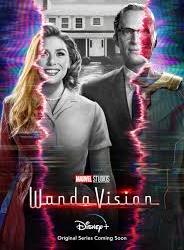
(Spoilers for the first five episodes)
Hey everyone! Well... it’s been a while, hasn’t it? The last time I wrote a proper review or Scribble, people still thought the COVID crisis would be over within a month. The poor saps. But I thought that as a special way to mark this year’s Valentines Day, we could take a closer look at the Marvel Cinematic Universe’s shittiest power couple in their new Disney+ show WandaVision.
The first of many MCU spin-off shows that nobody asked for, broadcast exclusively on Disney’s totally unnecessary streaming platform, WandaVision is about everybody’s favourite whitewashed Nazi experiment and her red sexbot boyfriend as they try to fit into a suburban sitcom neighbourhood without arousing suspicion.
Yes, you read that correctly. The MCU has a sitcom now. My life is now complete.
Sarcasm aside, I was legitimately curious about WandaVision because of its unusual setting. And considering one of my most common criticisms of the MCU is its total lack of creativity, anything that’s even a little bit subversive is bound to attract my attention. Of course ‘subversive’ doesn’t necessarily mean ‘good.’ I could hand you a canvas smeared with my own shit and call it subversive. That doesn’t necessarily make it good art. And that’s exactly what WandaVision is. A canvas smeared with shit.
So lets split this critical analysis/review/angry bitter rant into two distinct chapters. The first focusing on the plot and setting, and the second focusing on the characters. Okay? Okay.
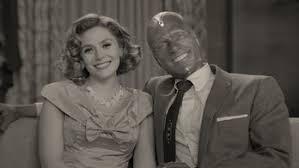
Chapter 1: Bewitched
Critics seem to be utterly enamoured with the whole sitcom gimmick, and it is a gimmick. As far as I can tell from the episodes I’ve seen, the sitcom setting serves no real purpose whatsoever other than to make the show ‘quirky.’ Which I wouldn’t mind, believe it or not, if the show was actually funny. There’s just one problem. It’s not.
Now in some ways describing why a sitcom doesn’t work is often futile because comedy is largely subjective. What I find funny, you won’t necessarily find funny and vice versa. With WandaVision, however, I won’t have that problem. I can demonstrate to you precisely why WandaVision, objectively, isn’t funny. And it all comes down to one simple thing. The stakes. Or rather the complete and total absence of stakes.
The show makes it very clear from the beginning that none of what we’re seeing is real. The cheesy theme song, the era appropriate special effects (mostly. It’s actually very inconsistent), the joke commercials, and, in the case of the first two episodes, which are in black and white, the appearance of red lights and objects in Scarlet Witch’s general vicinity. (Gee, what a mystery this is).
Basically Wanda has brought Vision back from the dead and created this sitcom world for them to inhabit. I’ll explain the stupidity of this in Chapter 2. The point is none of this is real, and that has a negative effect on the comedy because the very nature of comedy is suffering. Take the plot of the first episode. Wanda and Vision have to prepare a dinner to impress Vision’s boss. If they fail, Vision could lose his job and the couple could be exposed as superheroes. If this were a normal sitcom, it would work. The stakes are clear and it would be satisfying to see the two struggle and overcome the odds. But here, we know it’s not real. If it’s not real, it means there’s no stakes. If there’s no stakes, it means there’s no suffering. If there’s no suffering, there’s no comedy.
It would be one thing if the unfunny sitcom stuff lasted for like the first ten minutes or so before making way for the actual plot, but it doesn’t. Oh no. It doesn’t even last for the first episode. Out of the five episodes I’ve watched, four of them are almost entirely about these unfunny, objectively flawed sitcom homages, each set in a different time period. The fifties, the sixties, and so on. And what’s worse is that nothing that happens in them is plot-relevant. That gets relegated to the last five minutes of an episode. So you’re forced to sit through twenty five minutes of boring slapstick and puns in order to catch even a whiff of actual story. Which begs the question... who is this for exactly? It can’t be entertaining to Marvel fans, who have to slog through all this pointless shit so they can figure out what the fuck is going on. Comedy fans may get a kick out of the sitcom pastiche at first, but after four episodes, surely the joke would wear thin. So why is it in here? Clearly someone in the writer’s room absolutely fell in love with the idea of doing a Marvel sitcom, but nobody put in any time or effort to figure out how it would work in context.
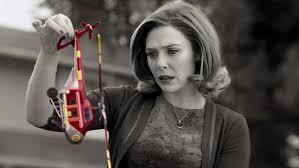
I cannot stress enough how bad the plotting of this series is. As I said, the vast majority of a thirty minute episode is about shitty sitcom plots that aren’t funny and don’t have any impact on the story, only to then tease you with a crumb of actual plot in order to keep you coming back for the next instalment. Admittedly it’s an effective strategy. I was more than ready to quit after Episode 2 until that beekeeper showed up out of the sewer (don’t ask. It’s not important). WandaVision essentially follows the Steven Moffat school of bad writing. String your audience along with the promise that things might get more interesting later on and that all the bullshit that came before will retroactively make sense by the end. Except, as demonstrated with BBC’s Sherlock, that doesn’t work. And even if it did, it wouldn’t justify wasting the audience’s fucking time. And that’s what the majority of WandaVision is. A waste of time.
The only episode that doesn’t follow the sitcom format is the fourth episode. Instead it basically exists to explain all the shit that happened before. The shit that the audience, frankly, are smart enough to figure out for themselves. Wanda created the sitcom world as a way of coping with the loss of Vision, blah, blah, blah. Yeah, we got it. Thanks. It doesn’t advance the plot or anything. It’s just a massive info-dump. But by far the lowest point was when Darcy (by far the most annoying character in the first Thor film and is just as obnoxious here) was sat in front of the TV, watching the sitcom and asking the same questions we were. Not even attempting to look for answers. Just reiterating what the audience is thinking. Like this is an episode of fucking Gogglebox.
In the end it becomes apparent why the series is structured the way that it is. It’s to hoodwink people into subscribing to Disney’s stupid streaming service. If you think about it, there was no reason for WandaVision to be a TV series other than to lure gullible fans in with a piece-meal story buried in a mountain of crap. This isn’t a TV show. It’s what is cynically known in the world of big business executives as ‘content.’ They’re not interested in entertaining the audience. Instead they crave ‘engagement’, which isn’t the same thing. Watching WandaVision is like staring into the void, waiting for something to happen, while Disney charge you for the privilege.
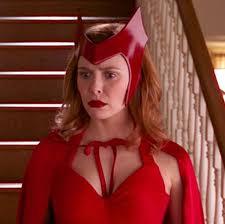
Chapter 2: I Love Lucy
So the plot sucks balls. What about the characters? Surely if Wanda and Vision are likeable at least, it’ll give us something to cling onto.
Well as I was watching the first episode, it suddenly hit me that I couldn’t remember anything that happened to them in previous films. I knew Vision died, but other than that, I couldn’t tell you significant plot details or their personalities or anything. Not a great start.
See, up until now, Vision and Scarlet Witch have been little more than background characters. So already there’s an uphill struggle to get us invested in their relationship, especially considering we haven’t actually seen that relationship develop. In Avengers: Age Of Ultron, Scarlet Witch is killing people because she’s pissed off about Tony Stark killing people (you work that one out) until all of a sudden she stops and joins the good guys because the script said so. Vision meanwhile is introduced as a convenient deus ex machina to beat Ultron and gets no real personality other than he’s a robot. Captain America: Civil War comes the closest to giving Wanda a story and personality of her own as it’s her actions that cause the Sokovia Accords to come into effect, but she never gets any real growth or payoff as the film is heavily focused on Cap and Iron Man’s penis measuring contest. And as for Vision, all he does in the film is accidentally cripple War Machine. No real character or arc there as such. And then we have Avengers: Infinity War, where Wanda and Vision are now sporadically in love and on the run until that pesky Josh Brolin, looking like a CGI cross between Joss Whedon and a grumpy grape, comes along and rips out Vision’s Infinity Stone to power up his golden glove of doom, and the film treats this like a tragic moment, except... it isn’t. Because we haven’t really had the time to properly get to know these characters and see their romance blossom. So instead it just comes off as hollow and forced.
WandaVision has the exact same problem. Apparently Wanda was so distraught about Vision’s death that she broke into a SWORD base, stole his corpse, brought it back from the dead... somehow, and then enslaved an entire town of people to create an idyllic lifestyle for her and her hubby while broadcasting it as a sitcom to the outside world... for some reason. Putting aside the dubious morality of it all, it’s impossible to really sympathise with Wanda or her supposed grief because we’ve barely spent any time with her. Had the Marvel movies taken the time to properly explore the characters and show us their relationship grow and develop, this might have had more emotional resonance. But no, it just happens. In one film they barely speak to each other and in the next they’re a couple. No effort to explore how they feel about each other or any of the problems that may arise trying to date a robot. It just happens and we’re just supposed to care. Well I’m sorry, but I don’t care. You’re going to have to try a little bit harder than that I’m afraid. What’s worse is that, thanks to the whole fake sitcom thing, it’s impossible to really become invested in Wanda and her plight because the show has to constantly keep us at arms length at all times in order to keep up the pretence that this bullshit is somehow mysterious.
Looking through the WandaVision tag, it amuses me how many people say that she’s acting out of character. And yeah, her actions are a bit of a head scratcher. Why would an Eastern European’s ideal life be an American sitcom? Why a sitcom? Why kidnap an entire town? Why keep changing the decade? None of it makes sense, but you’re wrong for thinking that Wanda is behaving out of character for the simple reason that Wanda has never actually had a character. In fact, ironically, Wanda mind controlling an entire town and forcing them to do her bidding is probably the one consistent thing about her as she did this in Age Of Ultron. In interviews, Elizabeth Olsen and Paul Bettany described how they used actors like Elizabeth Montgomery and Dick Van Dyke as influences, which is really funny because they’re straight up admitting they don’t have characters and even now they’re still not playing the characters, instead emulating the work of far better actors.
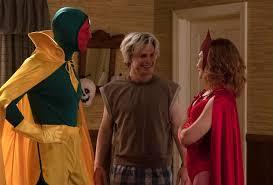
As I was watching the show, it became abundantly clear that not only do Marvel not have the faintest idea what they wanted to do with these characters, but they also straight up don’t give a shit about these characters. Wanda in particular has had a rough time under the tyrannical regime of the House of Mouse. First they cast Elizabeth Olsen, a white woman, to play a Romani character, then systematically erasing her Jewish roots, even going so far as to put a cross in her bedroom in Civil War, and now the character is being butchered even more by forcing her into an American sitcom housewife role that she apparently willingly chose for herself, which is laughable. I mean say what you like about Magneto in the X-Men films, at least they actually depicted his Jewish culture. At least they recognised his Jewish background was important (though not important enough to cast a Jewish actor apparently). Wanda’s steady cultural erasure over the years is incredibly insidious and judging by Olsen’s comments in interviews, where she called Wanda’s comic book outfit a quote ‘gypsy thing’ unquote, it seems nobody has an ounce of fucking respect for the character or the culture she’s supposed to be representing. (and to all those kissing her arse saying it was a slip of the tongue, she has been repeatedly called out for using the slur in the past, so at this point I’d describe her behaviour as wilful ignorance)
If you want further proof of how much Marvel doesn’t seem to care about Wanda, look no further than her brother Pietro, aka Quicksilver. At the end of Episode 5, Wanda brings Pietro back from the dead, except it’s not Pietro. It’s Peter Maximoff, the Quicksilver from the X-Men films played by Peter Evans, who coincidentally is not Jewish or Romani either. So Quicksilver has the dubious honour of not only being whitewashed three times, but also twice within the same franchise. But should we really be surprised at this point? It’s Marvel after all. The same company that whitewashed the Ancient One in Doctor Yellowface and claimed it wasn’t racist because Tilda Swinton is ‘Celtic’. But now I’m going off topic. My point is that this isn’t a simple case of recasting an actor like Mark Ruffalo replacing Edward Norton as the Hulk. WandaVision actually acknowledges the recast in-universe, which makes no sense. Why would Wanda bring back her brother, only to make him look like a different person? We the audience may be familiar with this version of Quicksilver, but she isn’t. That would be like me bringing my Grandad back to life and making him look like Ian McKellen. He’d be perfectly charming, I’m sure, but he wouldn’t be my Grandad.
If Marvel really cared about the characters or narrative consistency, they would have brought Aaron Taylor Johnson back. Instead, now they have absorbed 20th Century Fox into the hellish Disney abyss, they use X-Men’s Quicksilver as a means to keep viewers from switching off and so that people will write stupid articles and think pieces about whether the rest of the X-Men will show up in the MCU. It’s like dangling your keys in front of a toddler’s face to distract them from the rotting corpse of a raccoon lying face down in the corner of the room.
And it’s here where I decided to stop watching the show because fuck Disney.
Epilogue: One Foot In The Grave
You know, I am sick and tired of the so called ‘professional’ critics bending over backwards to praise these god awful films and shows when it’s so clear to anyone with a functioning brain cell how bad they truly are. WandaVision is without a doubt one of the most cynically produced and poorly structured TV shows I’ve ever seen. Its riffs on classic sitcoms are pointless and self-indulgent, the writing is terrible, the characters are unlikable and unsympathetic, and it’s entirely emblematic of what the entire MCU has become of late. And it’s only going to get worse as Disney drowns us with more ‘content’ to keep the plebs ‘engaged’. In short; pathetic.
189 notes
·
View notes
Text
On Having “Whiteness”
(~2,200 words, 11 minutes)
Summary: A metaphysics of “Whiteness” has overtaken actual sociology in the Democrats’ popular consciousness - blinding them to racial interventions that might actually work and taking them off the table of political discussion.
-★★★-
Donald Moss - On Having Whiteness, Journal of the American Psychoanalytic Association (emphasis mine)
Whiteness is a condition one first acquires and then one has—a malignant, parasitic-like condition to which “white” people have a particular susceptibility. The condition is foundational, generating characteristic ways of being in one’s body, in one’s mind, and in one’s world. Parasitic Whiteness renders its hosts’ appetites voracious, insatiable, and perverse. These deformed appetites particularly target nonwhite peoples. Once established, these appetites are nearly impossible to eliminate. Effective treatment consists of a combination of psychic and social-historical interventions. Such interventions can reasonably aim only to reshape Whiteness’s infiltrated appetites—to reduce their intensity, redistribute their aims, and occasionally turn those aims toward the work of reparation. When remembered and represented, the ravages wreaked by the chronic condition can function either as warning (“never again”) or as temptation (“great again”). Memorialization alone, therefore, is no guarantee against regression. There is not yet a permanent cure.
So both @arcticdementor [here] and @samueldays have linked me to this allegedly “peer-reviewed” article. The Federalist has a bit more context, but it doesn’t really make the situation better.
Race Theory Problems
Obviously, this is a work of sloppy thinking. The categorization of “white supremacy culture” or “whiteness” used by people like this is vague handwaving that describes being bad at management as “white supremacy culture,” and which in general labels universal human problems, like organizations being resource-constrained, or people being impatient, as somehow uniquely “white.”
But this sort of article is really what I mean when I say that social justice’s approach to “whiteness” is about “spiritual contamination.”
Samueldays called it “the ‘I’m not touching you’ of inciting race war,” and I may cover more of his response to it later. Suffice it to say, it has the same general kind of problems as “stolen land” arguments (where an entire present population’s living area becomes undefined), unbounded “reparations” arguments where no amount of transfers by the designated oppressor are considered to clear the debt, and so on.
This is exactly the sort of material that conservatives are seeking to remove government funding for and prohibit from use in employment training. This is the kind of material that the Trump Anti-CRT executive order prohibiting racial scapegoating was meant to cover.
Race Theory Definitions
This kind of stuff is, of course, not really defensible, so usually at this point people will argue that 1), “that’s not real critical race theory,” and then 2), “it’s just a few weirdos.” For those, I would say...
1) If it’s not real “Critical Race Theory,” then what is it?
We can’t measure or disprove Moss’s proposed “Whiteness,” and this malevolent psychic entity said to “deform” white people obviously isn’t based on a comparison with other human populations or historical periods. When it comes to “insatiable” appetites, one study argued that the Mongol invasions killed so many people that it showed up in the carbon record.
At best, it’s sloppy race science as practiced by an amateur, like twitter users idly speculating whether whites have ‘oppressor epigenetics’ - but with the veneer of official status. And it has similar risks to proposing that there is such a thing as biologically-inherited class enemy status, and other collective intergenerational justice logic.
Presumably, the Journal of the American Psychoanalytic Association is intended as a journal of science, or at least serious scholarship, and not of bad racist poetry with no rhyme or meter.
Moss provides a relatively pure example of whatever-this-is. I need to know what it’s called, so we can get rid of it.
Race Theory Prohibitions
2) If it’s just the product of a few race-obssessed weirdos, then it won’t hurt to get rid of it. So get rid of it.
The actual text [PDF] of the Trump Anti-CRT order does not ban teaching about the Trail of Tears, or Jim Crow, and so on, and both of those topics were taught in school before this recent wave of whatever-this-is was popularized.
Trump’s order banned teaching that any race is inherently guilty or evil due to the actions of their ancestors, and the level of resistance to this has been bizarre.
These teachings don’t seem to provide gains in relatively objective metrics like underrepresented minority test scores (or at least that’s not something I’ve seen - and the continued opposition to standardized tests suggests proponents do not expect it to), so it’s unclear just what of value is going to be lost here.
Collateral Damage
Samueldays wrote,
Because right now the conservatives talking about "critical race theory" as they fire in the direction of Moss et al. are very important in preventing another race war and you have a moral duty to help them aim, not throw smoke for Moss.
Right now Conservatives are assessing just how much stuff they’re going to have to rip out to make “standardized tests are racist” and “it’s impossible to be racist to white people” stop. While this may not be the message that Liberals are intending to send, it is the message that many people are receiving. (I discuss problems with both, and some alternatives to handle them better, in another post.)
Liberals need to get out in front of this. Sooner is better.
If Conservatives think that they have to gut hostile work environment law in order to avoid their children being taught that they’re permanently morally contaminated by their race, and Liberals have no means to actually close race gaps within a 4-8 year period (and right now it’s slim pickings on that front), Conservatives are just going to gut hostile work environment law.
Aether
From their perspective, why not?
Everything in the world is only six degrees of separation from something racist. Anything in the world can be tied to something racist. (So can anyone.)
But nowhere in this pervasive atmosphere of tying things to racism are there solutions. There are guesses based on correlations. Proposals. But usually when you reach out to grab them, to really get a grip on whether it’s correlation or causation, they dissolve in your hands. The few that do have any solidity to them are moderate in their success (such as Heckman’s involvement in the Reach Up & Learn study in Jamaica) - and don’t appear to be based on the same style of thinking as shown by Moss and others.
It isn’t just that trying to turn combating an invisible, non-measurable, unfalsifiable, parasitic psychic force into an actual political program would inevitably be oppressive and totalitarian. It isn’t just that articles like Moss’s are an in-kind donation to the 2024 DeSantis Presidential campaign for that very reason.
It isn’t just that unfalsifiable Metaphysics of Whiteness content like White Privilege Theory has been found to lower sympathy for the poor, and that present diversity training doesn’t work...
Race Content Crowding
This stuff is crowding out legitimate scholarship. I don’t just mean in terms of funding, tenure track positions, or high-flying magazine coverage - all limited by their nature. I mean among the base. I have been interrogating Democrats on Twitter for months, and not a single one has been able to cite a strongly-demonstrated intervention that’s being held back, or even a past one that was conclusively demonstrated to be effective. They can often recite a list of racial grievances on cue.
Tucker Carlson could run boomer_update.exe on a list of every educational failure since the 1970s, and they would be reduced to sputtering accusations of racism against people who increasingly don’t care. He could do this tomorrow. The only thing that prevents this is Tucker Carlson’s conscience.
I discovered the Reach Up & Learn program through Glenn Loury - described as a ‘conservative.’ Scott Alexander, attacked by the New York Times crew, brought some success with multivitamins to my attention. When I first heard about the Perry Preschool program, I believe it was from someone well to the right of him.
About the only one brought to my attention by the Democratic establishment constellation proper was lead removal, and the gains on that are probably getting tapped out. The frame it was proposed in was not Critical Race Theorist, as this was likely in 2012.
As it stands, I’m more likely to find something that works from someone the New York Times would disapprove of than someone they wouldn’t. Or, as Wesley Yang wrote,
Reality has been contrarian for a while.
Succeed Early
Even if we suppose that Conservatives are inherently racist, Liberals have a duty to support interventions that work. In fact, the more that Conservatives are a seething, undifferentiated mass of uniform racial hatred, the more important it is that Liberals stick to racial interventions that work, because nobody else is going to fix the problem if Liberals get it wrong.
It isn’t just a matter of resources per year. It’s also a matter of time.
From Heckman’s website,
Although Perry did not produce long-run gains in IQ, it did create lasting improvements in character skills [...] which consequently improved a number of labor market outcomes and health behaviors as well as reduced criminal activity.
Even if we propose an unlimited amount of funding (which is not the case), people and politicians only have a limited amount of time and attention each year. Newspapers only publish so many issues with so many pages each week. Television programs only cover so many hours for so many viewers each day. Even the dedicated can only read so many books in a year.
Even though the Perry intervention was imperfect, and the sample size was not as large as desirable, every second Democrat I talked to should have been able to answer the question “can you name an effective intervention?” with “what about Perry Preschool?”
Every year that we have entire cottage industries working on and popularizing contentious, ineffective, and backlash-provoking Metaphysics of Whiteness content, based on oversimplified oppressor/oppressed binaries, or theories in which power is held collectively by races as monolithic blobs (rather than modelling power as a network of relations between individuals, in which an individual of any background might be destroyed by the racialized relations in their environment), is another year we haven’t spent that energy on finding or implementing something that actually works.
This isn’t just an individual failure by Democrat voters, who typically have day jobs to focus on - it is a failure by the institutions who are supposed to inform and guide them. This institutional failure likely contributed to the popularization of Metaphysics of Whiteness content in the first place.
Okay, now what?
Donald Moss is a crackpot. Metaphysics of Whiteness content is unfalsifiable. The idea that there is a psychic parasite of “Whiteness” is not a legitimate field of study; it’s parasociology. The idea that “a sense of urgency” is “white supremacy culture” isn’t much better. [1]
We already tried isolating this content to obscure corners of academia, where individuals with high racial attachment could write about it. It leaked out.
We need to get this stuff out of the popular consciousness to make room for stuff that might actually work. The best way to do that may be to cut off the source. Since Donald Moss is a crackpot, perhaps it’s time we started treating him, and everyone else like him, as what they are.
People involved in Metaphysics of Whiteness content, like Donald Moss, need to be (figuratively) grabbed by the shoulder, and firmly, but politely, told to stop. Society has been recklessly handing out race-colored glasses to the general population since around 2014, resulting in a rise in amateur race science, of which both right-wing Twitter users memeing about Italians and Metaphysics of Whiteness participants like Moss are examples. If they do not stop, they must be stripped of institutional authority. Metaphysics of Whiteness content is unfalsifiable and we should not be certifying it.
If institutions refuse to reduce the authority of Metaphysics of Whiteness practitioners, those institutions must have their accreditation penalized, and their government funding reduced or eliminated, just as if they insisted on producing study after study on magic or ESP which failed to yield results. If they do not comply, they must be replaced.
It’s possible that Metaphysics of Whiteness content might have had some obscure, niche function in terms of the exploration of the idea space.
However, as it has displaced popular knowledge of interventions that might work, and the attention given to them in the political system, Liberals should seek to surgically remove it, at the very least until some more effective interventions see the political light of day.
If not, Conservatives will attempt to remove it with a bludgeon. "They described an entire race as ‘voracious, insatiable, and perverse,’ and here’s the citation for the exact page where they did that,” is perfect material with which to abolish entire departments.
-★★★-
[1] If we go a bit farther out, scholars of “Decolonization” argue that the field is wholly unconcerned with “settler futurity,” a phrase not much less ominous than describing “whiteness” as “incurable.” It seems that their entire job should be to answer the very difficult questions they have decided not to.
#racepol#american racepol#critical race theory#social justice#racial justice#longpost#flagpost#black lives matter
60 notes
·
View notes
Text
Fic: Wild
Rating: Explicit
Fandom: Triple Frontier
Relationship: Francisco 'Catfish' Morales x You (established relationship, no kids)
Tags/warnings: PinV sex and some light unintended violence but nobody gets hurt, not even feelings. fLuFf. Idek what I am anymore.
Summary: Sometimes, accidents happen, even in the throes of passion. Good thing Frankie has a sense of humour.
”Coming to bed?” You sit up on the couch and stretch, yawning a little. Frankie hums, not looking away from the TV screen.
”Depends. You in the mood?”
”You’re gonna have to try a little harder than that, lazy ass...” You elbow him playfully, which does inspire him enough to turn his attention away from the show he’s watching.
”I think we’ve been together long enough not to dance around the subject,” he grins, reaching for you but not fast enough; you’re already on your feet and walking out of the living-room. You turn around by the door to give him a wink.
”If you promise foreplay’s not going to be as underwhelming as that, then yeah, I’m game.”
”Just gimme a sec, then.”
You have time to brush your teeth and get into bed before Frankie comes upstairs, and he doesn’t disappoint when it comes to the foreplay. His moves may be familiar to you but they never get boring. He starts with an old school makeout session, kissing you until you’re breathless, caressing the hills and dales of your body. Proceeding to licking, kissing, and biting your nipples before going down on you, he makes you squirm with intense pleasure. He stops only to ask if it is underwhelming enough for you.
”If you stop now, I’ll punch you,” you whine, and he happily continues until the orgasm tears through you and leaves you gasping for breath. When he finally slams into you, hands on your knees and spreading your legs wide apart, you’re quivering with anticipation. Your head is thrown back at the impact, a hoarse groan escaping your lips. Frankie doesn’t give you any time to adjust but goes for it, pumping into you at a solid pace. He lets go of your knees and lowers over you, taking your arms up above your head and locking them there, effectively trapping you underneath him while purposefully fucking you, steadily and smoothly. You savour his lips and the prickle of his facial hair on the sensitive skin of your neck, and you put your hips into motion to meet his thrusts, letting your body move with his. Sex with Frankie may be predictable and safe sometimes, but that doesn’t make it bad. On the contrary: you always know you’ll have a good time and one, often several, orgasms. Holding back your loudest moans so as not to alert the entire apartment building, you are vocal nevertheless, communicating your pleasure to Frankie, as if he didn’t know from your flushed body and the way you keep squeezing your inner walls around him.
”Fuck, baby, that’s good,” he huffs and lets go of your arms to prop himself up with one elbow on each side of you. He kisses you breathlessly and does a series of quick, deep thrusts that pin you to the mattress. You keen, snaking your arms around his shoulders and digging your nails into his skin.
”Don’t – stop!”
Frankie grunts from the exertion but keeps the fast pace up before coming up onto his hands and really going to town on you with fast, shallow thrusts. You reach down between the two of you to rub your clit, your body tensing up and lower lip caught between your teeth to keep your voice down.
”Come on, baby, cum for me,” Frankie coaxes you, his voice strangled. ”Come on, come on –”
You press your fingers to your clit and throw your head back with a low moan, lightning bolts zapping up and down your spine and your pussy clenching around Frankie’s cock. He growls, and gives you a few last, deep pushes, finishing with a forceful slam that makes you shout out in surprise. Your hand, guided by some strange instinct directly connected to that last smash of his hips against yours, flies up, balled into a fist, and connects with Frankie’s face. The strike is not delivered with much strength but the abruptness makes Frankie call out and topple over.
”Fuck!”
Still reeling from the orgasm, it takes you a second to understand what happened, but as soon as you realize that you actually hit him, you sit up.
”Jesus christ, Frankie, I’m so sorry! Are you okay?”
He’s staring at you in disbelief, a frown lining his forehead vertically, one hand gingerly cupping his cheek. You put one hand on his knee and reach the other to his face, putting it gently over his.
”Did I hurt you?” you ask despondently.
”You hit me!” There is more wonder than anger in his voice.
”I didn’t do it on purpose, I swear, baby, I’m so, so sorry!” you reassure him, desperate to make him see that it really was an accident. You roll over onto your side of the bed and reach to turn on the bedside lamp. In the soft light, you turn back to Frankie, who’s now looking incredibly smug with a cocksure, broad smile.
”I know you’re wild but baby, that was on a whole ’nother level.”
”Stop joking, Frankie, are you okay?” You scan his cheek for signs of injury, finding none.
”I’m fine, don’t worry.” He chuckles. ”You hit like a girl.”
You bristle, forgetting your worry.
”I can try again and make it harder,” you say acidly. ”Glad you find this amusing. I was really worried and I felt awful!”
”Ah, c’mon, baby,” Frankie tries, scooting over next to your and kissing your shoulder. ”I got a right to tease you, you did actually punch me in the face.”
He looks up at you and to your infinite consternation you see that he can barely keep back his laughter.
”While cumming!” he adds with delight. You sigh, rolling your eyes. Relieved that he’s okay, you’re starting to feel less bad about punching him. Should’ve punched him harder, knock some sense into him.
”Is this going to be one of those things that you won’t let go of?” you ask in a resignated voice.
”You bet.”
”Thought so. Well, since you’re okay, I’m gonna sleep now.”
You lie down on your side of the bed and plump up the pillow before setting your head on it with finality. Pulling up the cover, you demonstratively hog more than you need of it. Frankie stretches out behind you with a deep sigh that you ignore. Your last orgasm was cut short and you’re not experiencing that wonderful, slack, post-coital feeling you usually enjoy after sex, and it’s making you crabby. Besides, there was no need for Frankie to be like that. You were genuinely concerned, and he just made fun of you...
You notice a tiny ripple in the mattress, and a sniffing sound from next to you. You turn around quickly and glare at Frankie while trying not to let the corners of your own mouth go up, because his mirth is contagious.
”You asshole!”
”I can live with that,” he wheezes, and give him a gentle slap on the arm and poking a finger between his ribs, causing him to yelp.
”I’ll jab you in the chin soon if you don’t stop!”
”I’m terrified of you now,” he admits, wrapping his arms around you. He’s still smirking when he kisses you and you slowly drag a finger over his cheek.
”Are you sure you’re okay?” you ask softly.
”For the last time, yes,” he promises you, with equal tenderness. ”You caught me by surprise, is all.” He chuckles, sliding one hand down to your ass. ”You made me shrivel up pretty fast. Barely got to finish.”
”If it makes you feel any better, I got cut off as well,” you confess.
”It does a little, actually.”
Softly, your hand seeks him out under the covers.
”I feel like I owe you,” you whisper before kissing him, and he has absolutely no objections.
Later, when you’re almost asleep, he murmurs in your ear:
”I’m gonna bring home field gear from the base. Let you really go to town on me.”
”Not funny...”
”I just like the way you say sorry, that’s all.”
”Good night.” You turn around and fall asleep.
#my fic#triple frontier#triple frontier fanfic#francisco catfish morales#francisco frankie morales#frankie morales x you#pedro pascal character fanfic
67 notes
·
View notes
Text
RWBY Recaps: Volume 8 “Ultimatum”
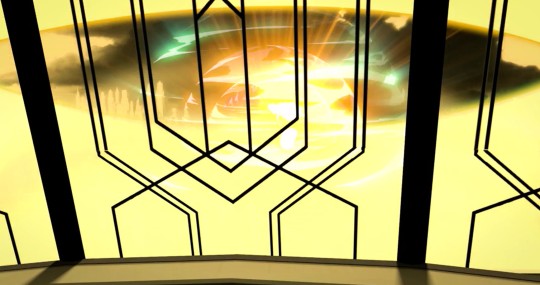
Welcome back, everyone! We had an unexpected break last week due to the horror going on in Texas. I'm glad we did. Not because of any salty "RWBY is bad right now yay free Saturday" feelings, but because keeping to a schedule for a fictional webseries should never take precedence over peoples' safety. I can't believe I need to type that sentence out, but it's true! Over the last seven days I've seen fans who are not merely disappointed by the mini hiatus (understandable) but outright hostile towards the crew because they... were ensuring everyone survived during an unprecedented emergency? Yeah. Given the highly critical nature of these recaps — including today's! — I want to be clear that my thoughts towards Rooster Teeth's creative choices are distinct from any thoughts about the crew itself, including the most basic forms of compassion like, “I sure hope everyone is okay over there.” In an age where it has become horrifically common to harass creators and even send them death threats over stories, it has likewise become necessary to remind people: Don't do that shit. Never do that shit. If I can teach anyone anything at all, let it be that!
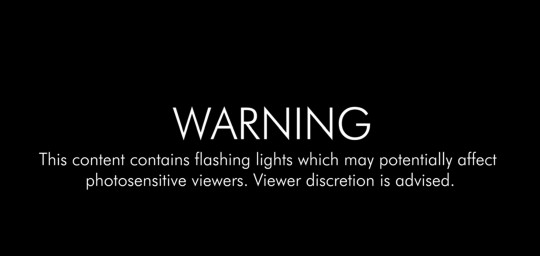
Anyway, dark fandom reminders out of the way, let's dive straight into our delayed episode. It was certainly a doozy. Titled "Ultimatum," we open on a trigger warning for flashing lights. Good on Rooster Teeth for including that, though I do wonder if creators shouldn't be including time stamps as well? Or perhaps a note that you can find those time stamps in the credits, avoiding any (minor) spoilers for everyone else? I'm not photosensitive myself, so I certainly don't mean to speak for that group, but my first thought was, "So how would I watch this episode if I was? Hand on the pause button, hoping I stop fast enough as soon as the lights start?" Hard to do given the surprise nature of the scene. Really, my answer would be, "Wait for the fandom to post warnings of their own, likely including where it happens so I know when to skip" which is perhaps an indication that this information that should be included from the get-go.
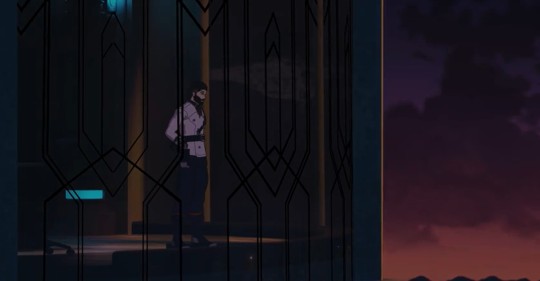
But I am glad the warning exists, regardless. The episode itself begins with a shot of Ironwood looking down at the kingdom. He's used his windows as a vantage point since Volume 7, so that's nothing new, but something about this particular shot reminded me of Ozpin, looking down from his tower. I'm sure the response from many would be simply, "Ah yes, the two power hungry dictators watching over their victims," but I think there's a much more nuanced reading here about leaders being expected to fix the literally unfixable and what that responsibility does to an individual. Of course, it's a nuance that is absolutely obliterated by the episode’s end, but the implication existed for a hot second!
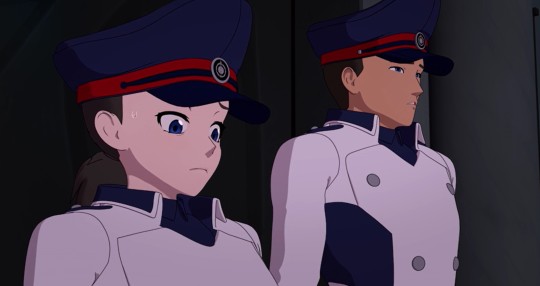
Two other soldiers are in the room with Ironwood, reporting that Cinder has helped Watts escape. They try to soften this with news that they still have Jacques in custody, but receive only a, "I don't give a damn about Jacques Schnee." Which, fair. He's pretty useless at this point. It's when Ironwood learns that both Qrow and Robin escaped too that he really gets mad, something his subordinates have been expecting given their scared expressions.
Now, I'm treading lightly here because I realize how this is going to sound given the end of our episode, but I still want to note that outside of that ending... this is a weird take? Just hear me out. Since Volume 7 the show has worked very hard to make Ironwood seem scary and unstable — bad setup for what we end with today — but the problem is that none of it works in context and it certainly doesn't work when compared to other characters' actions. They are literally in the midst of an unwinnable battle and thousands of his people are dying. If the audience wants a human being — who also just lost a limb and was betrayed by half his allies — o remain perfectly poised and polite during that, sorry, but that's not how human beings work. But even beyond this, what’s the message here? Ironwood raises his voice, so does Yang. Ironwood hits his desk, Qrow hits a child. If we're going to examine how Ironwood handles his stress and anger, he often handles it better than many of our heroes. Namely, by continually taking that anger out on inanimate objects. I kept waiting for him to attack his subordinates or attack Winter this episode, especially given where we end up, but it never came. Ironwood always has enough control to break the desk or punch the wall, not the person in front of him. Which, of course, would not be a good thing in the real world. I want to be clear given these sensitive subjects that if someone is breaking things in your presence that's a major problem to address. But this isn't the real world. This is a fantasy world in the middle of a war, populated by other characters who express their anger by punching people, slamming them into walls, or screaming at them until they run away. The story wants us to fear Ironwood long before he makes his objectively horrific choices and it tries to achieve that by showing us characters who are clearly terrified in his presence, by giving us a string of broken objects in his wake. But those details don't land well when we compare them to other instances of stress. In the same volume I have watched Ironwood take a deep breath to calm himself down when things have gone horribly wrong. I've also watched Weiss start a conversation by threatening her defenseless brother. So again, what’s the message here? It can’t be that acting violently towards someone = villainous behavior because, as established since Volume 6, that’s common for the heroes. Why are these subordinates terrified about Ironwood slamming his fist on a table, but Whitley has no problem hugging the woman who threatened him? Obviously there is a HUGE difference between our main group and Ironwood when it comes to other actions (cough-bomb threats-cough), but these day-to-day moments don't match up. The show wants to use violence as a way for us to easily identify the Bad Guy while ignoring all the times when our heroes do the same thing.
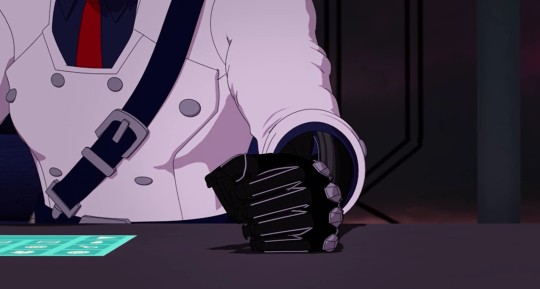
All of which isn't meant to be a defense of Ironwood. As we'll see in a bit, there is no defense for what he's done. Rather, it's a way of acknowledging just how badly he's been written. Why does a man who consistently reins in his anger and takes it out on objects suddenly shoot a councilman for literally no reason? Why does a man defined by wanting to save as many people as he can suddenly threaten to bomb his city? Ironwood's characterization is all over the place, in the sense that they keep writing him as the morally gray, sometimes harsh, but ultimately compassionate man he started out as... up until they need a villain. Salem isn't here yet, so Ironwood can shoot Oscar. Salem isn't attacking yet, so Ironwood can shoot the councilman. Salem is currently reforming, so Ironwood can threaten YJR and Mantle. He's the B-plot villain whenever Salem is out of commission, which is a problem for both their characterizations. This filler doesn't make sense for Ironwood and it severely undermines the threat of Salem. You finally introduce the Magical Big Bad and our heroes are facing more of a threat from a guy with a broken army and three loyal allies left? Hmmm.
The tl;dr is that Ironwood's arc is a disaster and, frankly, it's gotten old reading simplified takes of, "It's just a realistic look at what white U.S. men will do in power sweetie :) " RWBY does not have the context capable of conveying that sort of critical take because our world is not besieged by literal monsters and an immortal witch, to say nothing of how real life good guys do not get deus ex machina canes that fix the problem instantaneously. Ironwood is not an example of anti-U.S. imperialism, he's an example of writers who don't know how to write.
Anyway, I'm getting severely off topic. Obviously Ironwood is a major part of this episode, but the problems demonstrated here are two years in the making. This is the culmination of things I've been discussing for months across hundreds of posts... so I should probably stop trying to summarize it all in a few paragraphs lol. Perhaps when RWBY is over — or Ironwood has died — I'll do a single meta on his character, try to pull everything into one, unified argument.
For now though, we have an episode to analyze.
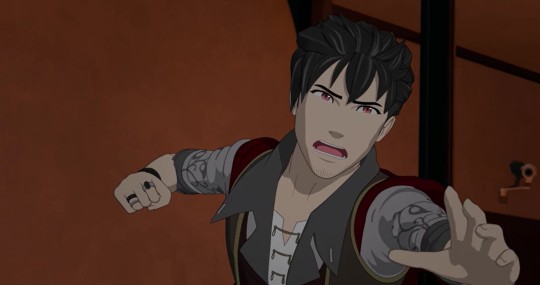
While Ironwood is receiving this news we get flashbacks to Qrow and Robyn. Qrow attacks a soldier in his bird form, which is hilarious. Someone GIF that please. It does raise some interesting questions about this magic though: does Qrow retain his aura and strength in this form (something I thought given his choice to transform during the explosion), or was that soldier just so shocked at being attacked by a crow that he went down easy? We'll never know, because that would require establishing concrete rules for this world. The point is Qrow is going feral in his freedom, throwing punches left and right — did he kill that guard? — while Robyn watches it all from under a rock. They're apparently still somewhere in the facility since all the exits are guarded, but that's not the good thing Ironwood seems to think it is. After all, Qrow is out to murder him. He wants to be there.
We all see where this is going, right? The show is going to ignore Qrow's crazy belief that Ironwood got Clover killed in favor of a "Qrow saved Mantle by murdering Ironwood"/“Qrow got revenge for Mantle by murdering Ironwood” ending. Who cares why Qrow wanted to kill him in the first place now that Ironwood has his finger on the trigger? If RWBY is good at anything, it's writing moments that encourage you to ignore everything that came before it. We'll be seeing more of that in just a bit.
"Damn it!" Ironwood yells, because the show is leaning into its cursing. He orders that the subordinates not return until "you have Qrow Branwen in custody." Here we have another great example of the show conflating what the audience knows with what other characters know. See, we know Qrow has a vendetta against Ironwood. We know their relationship is the important one to the story and that Robyn is incidental. Ironwood doesn't know that. There's no reason for him, as a character, to specify that they only bring Qrow back, but it makes sense for the audience who has the whole, thematic picture. Our understanding of the situation is influencing Ironwood's dialogue, which is... not great.
This entire scene we've had creepy music to hammer home just how evil Ironwood is. Except, as said, he takes a breath to calm down and the music fades. Instead of flying into a rage, hurting someone, or doing anything the music suggests he might, Ironwood calmly calls in for an update — which is when the explosion hits.
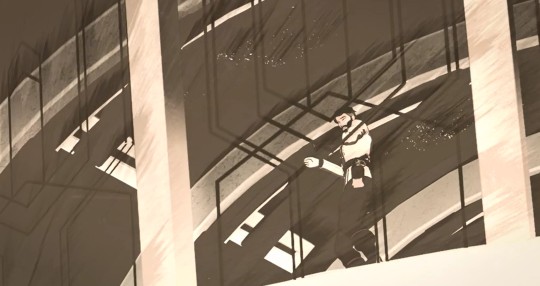
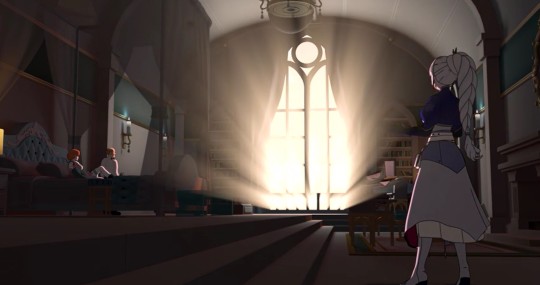
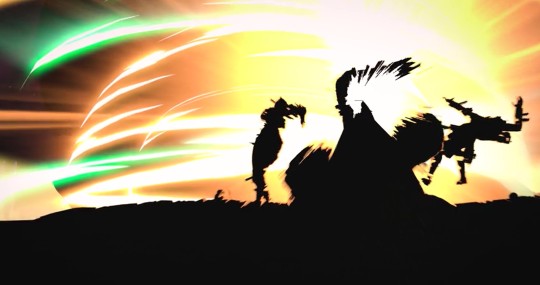
It's MASSIVE, seeming to originate from a lightning strike, which is weird, since it's coming from inside the whale, but whatever. The animation is very dramatic and pretty, as we've come to expect of RWBY, but the actual plot is lackluster at best. It's funny though because I thought for a hot second, when Winter and the Ace Ops were caught in the blast, that RWBY had actually done something exciting. I mean, holy shit! There are the deaths we expect from a battle like this. My god, what is everyone going to do when they realize that Oscar's needless attack took out five characters, including Weiss' sister —
No wait, never mind. They're fine.
Let's talk about that "needless" descriptor for a moment though. Do you all remember, two weeks ago, when I went, "Hey, why isn't anyone telling Oscar that that Ace Ops are approaching with a bomb? They're on a time limit! If someone would just mention that Very Important Information then Oscar wouldn't keep standing around to fight Salem." See, at the time I was frustrated because of how the plot was needlessly allowing Oscar to put himself in danger (especially when the whole point of this mission was to rescue him). Now, I'm frustrated because that same plot needlessly wasted the most powerful weapon the group had. There was no reason for Oscar to use literal lifetimes worth of stored energy when the heroes already had a bomb to do the same job! What was the point of that? I guess he took out the other grimm too, but without the whale that still would have been a challenge with a finite end, one Ironwood's army and the remaining huntsmen should have been able to handle. It doesn't feel justified to have Oscar use a weapon kept on the bench for lifetimes when there was another option literally minutes away.
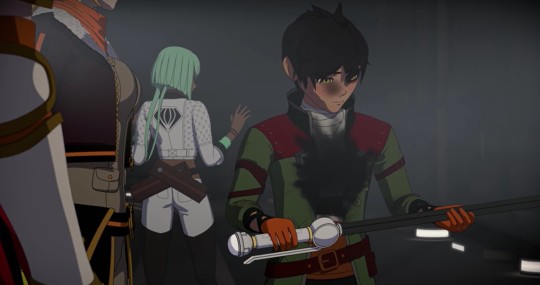
There's so much wrong with this I need another list. So:
Ozpin's cane supposedly stores kinetic energy, which may contradict what we've seen from it before. Regardless, we’ve never heard about this. The all powerful weapon comes out of nowhere
It also begs the question of why Ozpin wouldn't use that power at Beacon and why he wouldn't insist that they try to get their cane back while captured. You had an out this whole time! But we’re going to ignore that because Oscar is a little hesitant?
Which makes YJR's presence even more useless than it originally was, which was already pretty useless. Oscar essentially rescued himself
This kinetic energy miraculously doesn't hurt any people or buildings, just grimm
So what is the point of Silver Eyes? That's been their MO since they were first introduced. Sure, Silver Eyes can be used far more often than Ozpin's cane, but it still feels like a let down to learn that the Big Secret behind this weapon is... the exact same thing Ruby has been doing for years
Like Ruby, Oscar likewise didn't need any practice or training. He just set off this massive attack perfectly and without issue
We have now eliminated the biggest threat to the cast instantaneously — the whale and the other grimm — with no effort from the rest of the heroes. Like the Hound, the stakes are obliterated with no satisfying work on the part of our protagonists
Instead, as said, the actual plan already in place never happened. The bomb just... goes back. Kind of like how Cinder attacked and then just went back to Salem. Penny woke up and then just got knocked out again. We continue to go in circles
This is because no one took two seconds to tell Oscar, "There's a bomb on the way"
Because this threat is gone the show needs a new one, hence Ironwood randomly threatening Mantle with said bomb
The one way we might have justified Oscar blowing up the whale instead of Winter is if he did it to save Hazel, but Hazel is implied to be dead
Maybe he's alive, but if he's not that happened off screen and we're not sure how. It couldn't have been because of the blast itself — everyone else is fine — so what, Salem somehow killed him before she was blasted to bits? While he was holding her?
And there's no body?
Salem was torn apart multiple times during that fight and reformed instantaneously, yet now, conveniently, she's taking her time
None of the characters mention the issues above. None of them admit that there was no reason for Oscar to waste LIFETIMES worth of power when they already had a solution in the works. Fantastic
I need to take a moment to acknowledge that so far this recap feels... bad. Disjointed. Bit all over the place. Which makes a certain amount of sense because that's where my thoughts are at. There's so much going on in this episode — so much wrong with it — that I don't know how to boil it all down into a few, neat claims. This episode is a mess! We're barely a few minutes in and the combined issues of Ironwood's characterization and Oscar's choice have left me reeling. So if you're still reading this, bless your patience, I think we'll both need it for the rest of this journey.

Let's snag a neater plot-point to discuss. Amidst all the chaos Neo literally skips away with the Lamp, clearly thrilled at how her own life is going. Later in the episode she'll text Cinder with the obvious: Salem is going to be pretty pissed when she realizes this is gone. “If you want her name you know what you owe me."
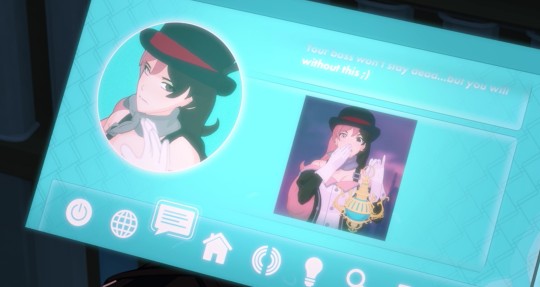
So wait... what is Neo leveraging here? Is she agreeing to give the Lamp back so Cinder doesn't get in trouble with Salem? Give Salem the password she's been looking for? Or give Cinder the password to use the Lamp for herself? What would Cinder even want the Lamp for when she's after the Maiden powers? I'm confused about what Cinder is being blackmailed with. Regardless, she needs the lamp for something and presumably what she "owes" Neo is Ruby. We get a cut to her just to hammer that home.
(Side note: both pictures of Neo are hilarious.)
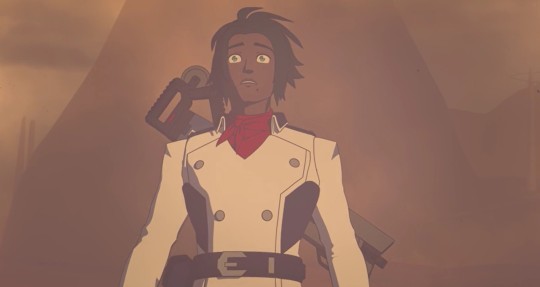
Before that though, back at the whale, everyone is taking stock of the situation when Marrow cries, "Hey, they were still in there!" I feel like this is another scene meant to make him look like the one good guy in the group — he cares about YJOR while the others can’t be bothered — but as always, that reading doesn't fit well with the situation as a whole. The others have barely had time to realize they're alive. I don't think it's a moral failing that they didn't instinctually worry about four betrayers, one of whom attacked them, while they're still checking that they have all their limbs intact. Besides, why does Marrow assume they're dead? The Ace Ops were caught in the blast as well, yet miraculously came out unharmed. They clearly didn't set their own bomb off, so it's logical to assume that YJOR did something themselves. It feels weird to have a "Marrow mourns them and Winter is the only other character who cares" moment when everyone is recovering from bomb shock and no one even knows if the others are dead. But, of course, the show is out to portray only two of these characters as good people, so ignore the logic and run with the emotion of the scene.
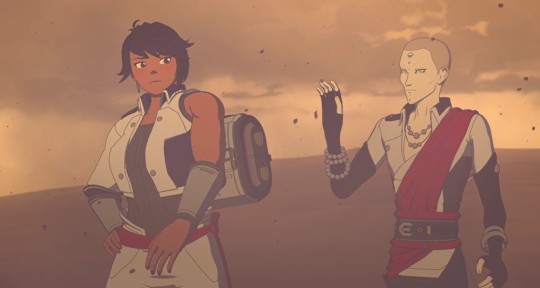
All of which is bolstered by Elm pulling away when Vine puts a hand on her shoulder. Why is she acting cold towards him now? Because they're not friends, remember?
While we get more ridiculous relationship dynamics, Ironwood calls in and congratulates them on the bomb working, but tells them to get back because they have another problem in the works. That would be Qrow and Robyn. Winter decides to tell him about the bomb in person.

We cut to Watts and Cinder watching the remnants of the blast from a rooftop. Cinder has tried calling, but no one answered. Unsurprising, given that Salem doesn't have any other allies left. Cinder says that the plan hasn't changed, she's still going to take the Winter Maiden's power for herself, and Watts can help her by bringing Penny here. He explains that he doesn't have full control over her. Rather, he implemented a virus that is setting her on a single path: open the vault, then self-destruct. Cinder, as one might expect, is furious.
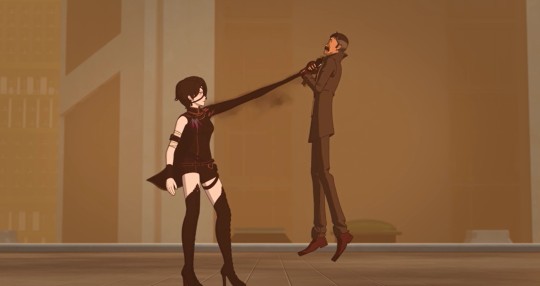
She snags Watts by her grimm arm and threatens to toss him over the side of the building. Thus begins the best part of the episode, hands down. Despite the danger he's in, Watts throws common sense out the window in favor of dragging Cinder in the most satisfying manner possible.
“You think you’re entitled to everything just because you suffered, but suffering isn’t enough. You can’t just be strong, you have to be smart. You can’t just be deserving, you have to be worthy! But all you have ever been is a bloody migraine!”
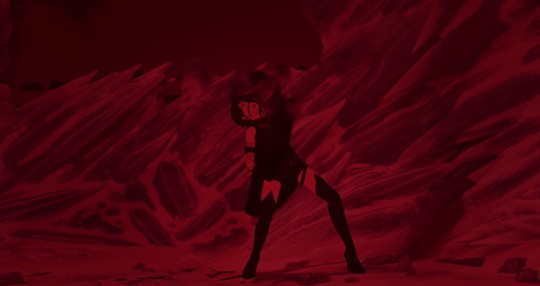
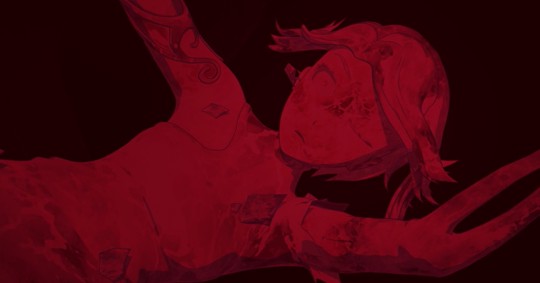
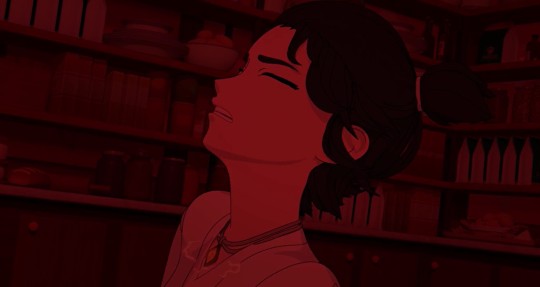
It's true! You know what else is true? This speech could apply to our heroes as well. Accusations of entitlement and reminders to be smart as opposed to just strong hit hard, considering those are the same flaws our protagonists are struggling with. The difference is that Cinder, miraculously, listens, pulling Watts back to safety and going to cry by herself. That moment is simultaneously more growth than Ruby has gotten and more sympathy than Ironwood has gotten. The woman who murdered Pyrrha is treated more kindly by the narrative than one of our initial heroes and our very first villain has taken more time to reconsider her choices than our title character. You know a show is falling apart when excellent choices are applied to the worst possible character.
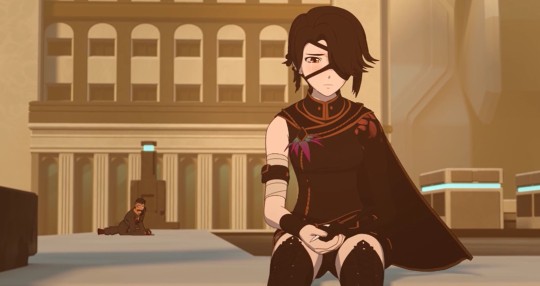
So Cinder is crying while Watts looks guilty and we cut back to YJOR's group post-blast. Yang is finally able to answer a call from Blake who is obviously overjoyed to see her. Weiss gives them directions to the mansion and they ask what in the world they'll do with Emerald, currently on her knees, mourning Hazel.
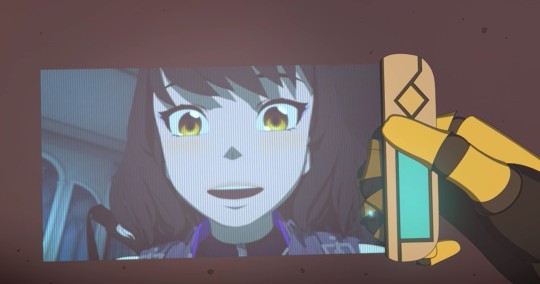
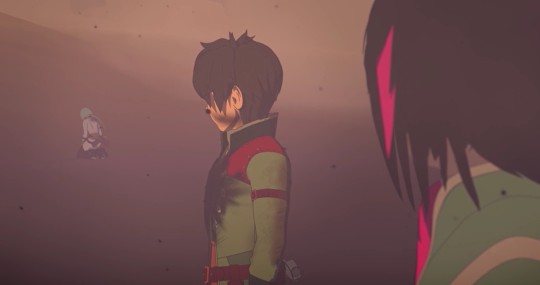
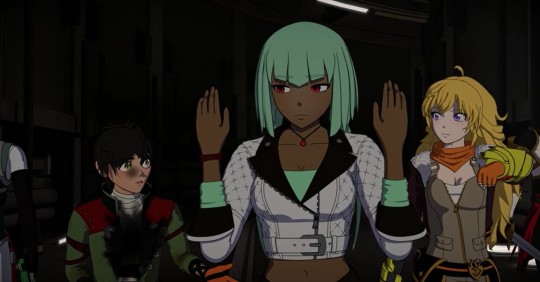
Thus begins the third most frustrating part of this episode. See, on the way back the group continues the conversation about what to do with Emerald, with Yang and Jaune distrusting her vs. Ren and Oscar encouraging cooperation. I can't believe I'm saying this after's Ren's speech and Oscar's entire existence... but I'm team Jaune and Yang here. Look, what Oscar and Ren say — the literal words coming out of their mouth — is nonsense. Ren goes, “We can’t let all of our actions stem from fear," as if Yang and Jaune are being ridiculous for mistrusting Emerald, one of the established villains, after years worth of harm from her. It’s weird that Yang points to her arm as something Emerald is responsible for, rather than being framed or the deaths at Beacon, but the general sentiment of, “She’s done horrible things!” is true. Ren’s perspective is the same simplification that was applied to Ironwood last volume, wherein everyone acted as if he was crazy for fearing an attack on his kingdom... post an attack on another kingdom and pre an attack on his kingdom. Putting generic lines in Ren's mouth about not being afraid makes him sound willfully ignorant, as if choosing to believe that someone is good will magically make them so, to say nothing of thinking it will erase all the harm they've already done.
Oscar at least acknowledges the difficulty here, but then follows this up with, “You don’t have to forgive her… just give her a second chance."

Oscar, honey, that amounts to the same thing in this situation. Allowing Emerald a second chance means working with her, which means trust, which means emotionally reaching a point where these characters can put aside the harm she's done them in an effort to give her that chance in the first place. This actually ties into a post I saw last night, one I've come across before, that claims redemption arcs don't require any suffering on the part of the person who has done wrong. I agree in theory, that prolonged suffering doesn't help anyone, but the problem is that people tend to conflate suffering with consequences and someone who has done this level of harm should face consequences for their actions. The problem with redemption arcs is not that the bad people suffer too much — emotionally and physically beating on them as a form of revenge — but that the people they've harmed are put into situations like this one. If Yang and Jaune let Emerald go like she suggests, they are agreeing that she doesn't have to face any consequences for the damage she's done (which, keep in mind, involves multiple deaths, not including all the lost lives here in Atlas). If they agree to give her a second chance, they are forced to jump straight to some level of forgiveness. We might claim they don't have to forgive Emerald to work with her, but from a practical perspective how are they meant to function, especially during a warzone? Anything she provides them with — information, watching their back in a fight, undertaking missions, etc. — requires trusting her enough to allow those things to happen: working with that info, letting her protect them, allowing her that responsibility. It's all about trust, trust she has yet to earn. In order for a redemption arc to be successful, the power has to be in the hands of the victims. They need to be able to see some justice for what was done to them, be offered some proof that the person in question has truly changed, and have the ability to walk away if they decide no, I don't forgive you, glad to hear you've improved, but please stay out of my life. Jaune and Yang have none of that. There are currently no systems in place for Emerald to face consequences for her choices, she has offered them no proof of her remorse or true motivations, and the other half of the group is pressuring them to give her that second chance without closure or reassurance. None of that makes for a good redemption arc and reducing that to, "So you want to see poor Emerald suffer, huh?" ignores the suffering she has already caused. The group are her victims and they are under no obligation to give her a second chance, particularly under these circumstances, which makes the story's choice to have Ren and Oscar act like Yang and Jaune are being stubborn or inconsiderate a problem. The conversation boils down to, "Give the woman you know to be a liar, manipulator, murder accomplice, and servant of our enemy a second chance based entirely on unfounded faith. If you don't you're letting yourself be ruled by fear."
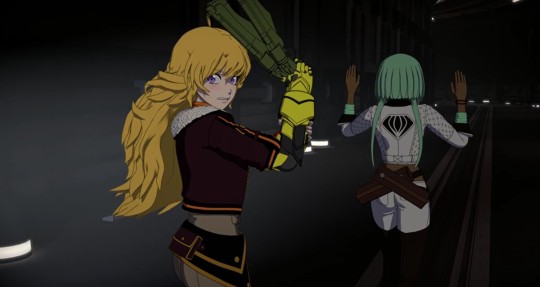
RWBY's touchy-feely themes really don't sit well within its realistic, morally gray premise. We cannot continually have these characters go through hell one moment and then have others accuse them of being paranoid the next. The fact that all of this is wrapped up in the group trusting Robyn, Emerald, and Hazel over their established allies remains beyond frustrating.
Because yeah, you know how Oscar finishes his speech? “I’ve already gotten a lot of help today from someone I don’t exactly trust right now." Meaning Ozpin.
The story is trying to compare Emerald and Hazel to Ozpin.
"Oh hey, I kept a secret from you after lifetimes of watching that secret lead to betrayal and death. I keep apologizing for my mistakes while ignoring that I had no reason to trust a bunch of kids with such world-shattering information and also that you tore it from me in the most traumatic way possible."
"Oh hey, I willingly joined our world's version of the devil and helped her destroy your school, leading to numerous deaths including your friend and headmaster. It was his death that put Oscar in this position in the first place! I then continued to attack your group, leading to another near death of a friend, and a kidnapping, and the destruction of Amity, until I became scared enough to make a run for it."
Which one of these characters is granted an instant second chance? You'll never guess who!
And I do think the word "instant" is important here because just like Jaune and Yang have the right to have distance and justice from Emerald, they had that right with Ozpin too. The difference is they got it. They had the power in the situation, as evidenced by their use of the Lamp and physically attacking him. Ozpin heard what they needed from him — leave us alone — and did that without complaint. They were given months to come to terms with the secrets he kept. They were offered apologies and acts of service to demonstrate intent: saving them in the airship and continually saving Oscar. I don't believe Ozpin ever needed a redemption arc, but even if we think he did, he had it. After three volumes of material Oscar's perspective is still "I don't exactly trust [him] right now" but Hazel and Emerald have earned at least the same amount of trust in a matter of hours? They're really having my boy look at the guy who has tried desperately to do right by him despite unimaginable circumstances, and the guy who tortured him to get information for Salem, and went, "That first guy. He's the one we need to watch out for."
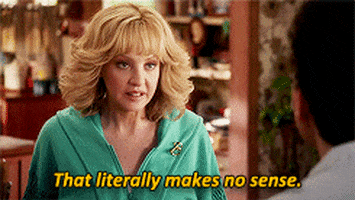
To make things even worse, Oscar tells the others that Ozpin took on all the torture so he wouldn't have to. So he did that and they still don't trust him? If you had told me back in Volume 6 that two years later the group would still be hostile towards Ozpin, while simultaneously urging one another to trust Emerald, I would have said you were lying. RWBY has its problems, but it's not that bad. Yet here we are. I suppose the one silver lining here is that Ren smiles when he realizes Ozpin is back? So at least one of them isn't prepared to draw their weapon at the mere mention of his name.
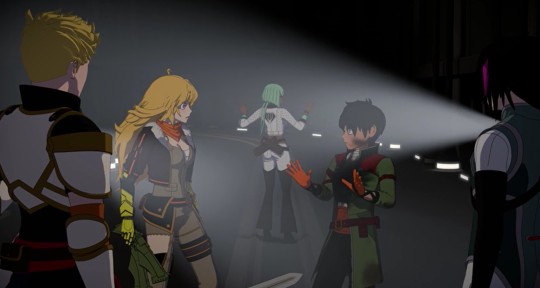
Both these moments raise more questions though. How in the world did Ozpin take on that torture when we clearly saw Oscar getting pummeled for a good portion of the kidnapping? Is that a weird merge thing the story hasn't bothered to explain? I wouldn't be surprised, considering Oscar said last episode he didn't want to use magic because it hastened the merge, he uses the biggest explosion of magic we've ever seen, and nothing has changed. Ozpin is still in the back of his head, thanking him for the tinniest shreds of decency they get. Ren, meanwhile, seems to be back to mindreading. How in the world does he know that Ozpin is back? I assume it has something to do with his semblance, but we don't know what. They could have shown us Oscar from Ren's perspective, perhaps with two distinct emotions swilling around to imply that he sees two different people now, not a useless shot of Emerald with purple flower petals, whatever purple means.
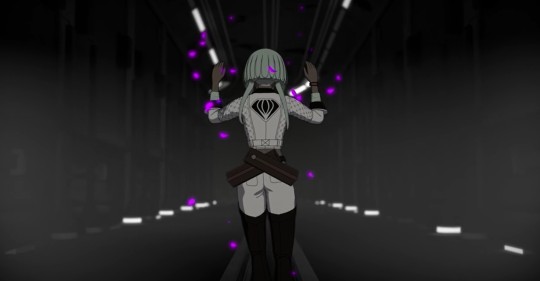
Oh, but no, we shouldn't have gotten either of these scenes. Remember that Ren's aura broke a very, very short time ago? Is it back already? Can he use this part of his semblance without it? Considering it was near impossible to see Ironwood's aura breaking in the Watts fight and we were then mistakenly told he used his semblance in the office, I'm going to go with, "The writers forgot."
Oscar explains that the cane had "lifetime after lifetime" of power in it and though there's still some left, "we have to be careful with how we use the rest." He says that Ozpin trusted his judgement and of course he did! Ozpin also didn’t know that there was a bomb on the way. Yet funnily enough, no one else mentions that, whoops, your choice made in ignorance was a waste and that's due entirely to us prioritizing hugs over basic mission information.
Also, all these explanations take place in front of Emerald. Half the group doesn't trust her, but they'll freely discuss their powers and limitations here. Remember how the group once wanted to talk about magical relics in front of the old lady they'd just met? Yeah, they've learned nothing.
Combine all this insanity with the fact that Ozpin's magic saved the day before Ironwood's bomb could do the same... while Ruby sat in a mansion drinking tea. Who's our hero again?

So things are a hot mess, to put it lightly. Their conversation finally ends when they hear voices and round the corner to find all the Atlas citizens huddled in the subway. For once the show actually writes them in a sympathetic manner, emphasizing how terrified and helpless they are. This image doesn't lead the group to any revelations though, certainly not anything that would tie back to Ren's earlier speech in the snow. No, once again the justified criticisms here are ignored as we hear that “However this fight ends, we could really use someone like you, [Emerald.]” That's it then. Discussion over. We knew as soon as it started that blindly trusting her was being presented as the "right" thing to do and now here we are, deciding that conclusively, despite Jaune and Yang's complaints. By the time the group reaches the mansion, Oscar is defending Emerald from Ruby. We're supposed to just accept that she's a part of the group now, only minimal pushback allowed.
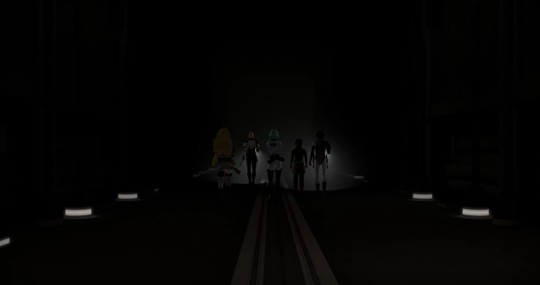
Before that though we return to Ironwood getting news that their bomb never went off. He briefly wonders who else could have done that, but puts the currently unanswerable question aside for what he does know. They still have the bomb and it could be "useful." See, this moment — like shooting Oscar and the councilman — is when Ironwood just randomly goes off the deep end. One minute he's talking about what they've lost and cradling his new arm,
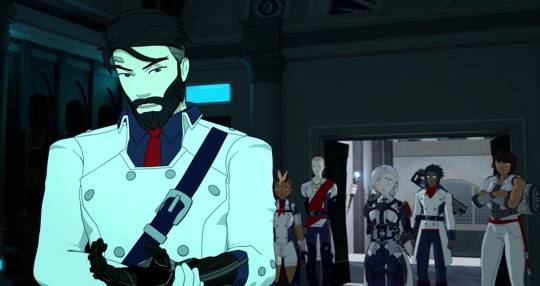
the next he's saying that he should have tortured Qrow to get Penny to obey him! Which doesn't even make sense since I'm pretty sure Penny hasn't ever spoken to Qrow. She wouldn't want anyone to suffer, true, but it's not like Ironwood had a close friend like Ruby to use as leverage. Qrow is just Some Guy to her. Regardless, he thinks Yang, Jaune, and Ren are decent replacements, despite Penny also having no relationships with them. This is what happens when your characters only start breaking up their teams eight years into the story, the response to Ironwood wanting to torture Ren to hurt Penny is, “Does Penny know Ren exists?” But, you know, torture is torture, right? Maybe. Probably not. I mean, if they're going to turn Ironwood into a cartoon villain, they could at least keep him smart.
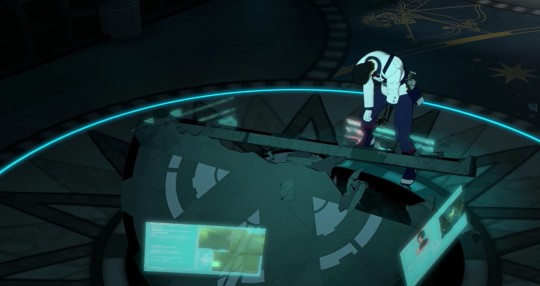
Because all of this is just the height of stupidity. Ironwood wants to torture people Penny barely knows to make her listen (so just grab some civilians? It would do the same job...). Ironwood wants to shoot down empty ships, even though no one, including us, knows where in the world those ships would have gone. Ironwood wants to destroy an entire city to try and save another city. He wants to use a bomb meant for a comparatively small whale and acts like that alone will take out the majority of a kingdom. None of it makes sense! And I know the easy comeback for that is, "Well yeah, Ironwood is crazy and evil" but he's not. I mean he is. Threatening torture and bombings is obviously evil, but he's never been insane, or stupid. As said before, his arc (or lack thereof) is an absolute disaster. The fandom assumes so many things about Ironwood given the opportunity — the whale is a suicide mission. He expects the Ace Ops to die on his order — and the writing hints at so many things that never happen — he's going to hurt his subordinates, attack Winter for disobeying him — and every time what we actually get is a far more compassionate, level-headed character... until he randomly does a 180 and goes, "Let's murder a whole city now!" I never wanted Ironwood to be the bad guy, but they could have at least given me a persuasive decent into this level of horror.
So... yeah. Ironwood has got to die by the end of the volume, yeah? Between Ruby warning the whole world about him and him going into full villain mode, there's no coming back from this.
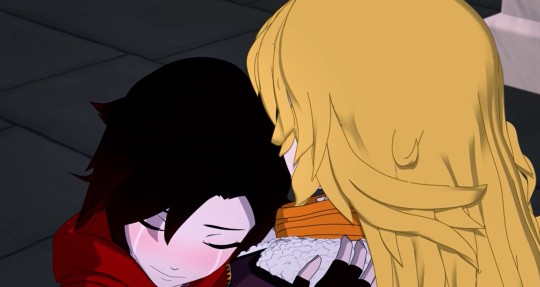
Neo sends her text to Cinder and the group makes it back to the mansion. Remember Yang's criticisms of Ruby's leadership? The ones she conveniently forgot about when Ren started to agree with her? Yeah, those are entirely gone as the sisters hug it out and, presumably, forgive one another for... daring to admit that things are bad? Look, I'm not going to deny that Ironwood's scene with Winter was creepy as fuck,
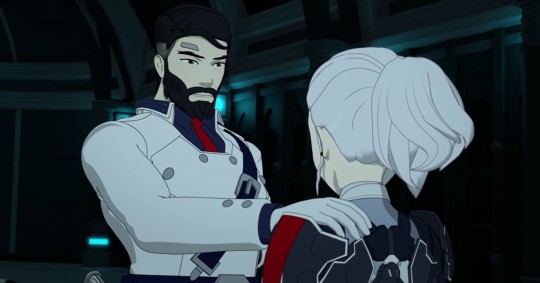
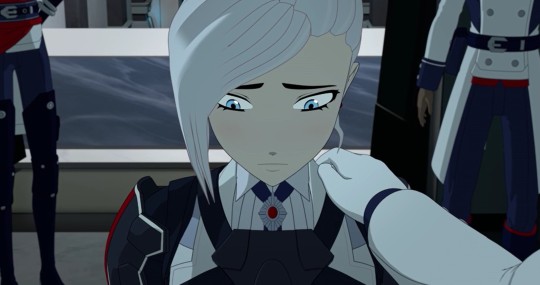
but I'm not of the opinion that the heroes are any better when it comes to the theme of obedience. They've attacked one another, screamed at one another, and any dissent from Ruby's leadership results in the questioner being left behind in the snow. We'll accept you again when you fall back in line. I used to adore the relationships in this show, but watching them now is just discomforting. The show might be 100% more obvious with Ironwood, using creepy music, a smile, and that hand on Winter's shoulder, but the concept of, "Sorry I dared to question you before! We won't ever do it again :)" isn't healthy either. The fact that the show keeps erasing theses problems with hugs — Weiss hugs Whitley now, Yang hugs Ruby, someone will probably hug Emerald soon — doesn't make the circumstances any less uncomfortable.
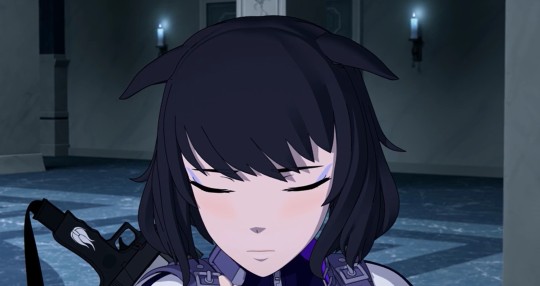
None of this even gets into the Blake and Yang hug. First of all, why is Blake acting like they had a fight and Yang might not want to see her? She's hiding inside rather than rushing to greet them, ears down in a devastated expression until Yang touches her. Combine this with Yang's "Do you think she's mad at me?" and it feels like the writers cut a fight in the final script and then didn't bother to remove the fallout from that. Seriously, where did any of this come from? You can't just have characters act like they've been fighting when they haven’t.
Also, can't forget this.
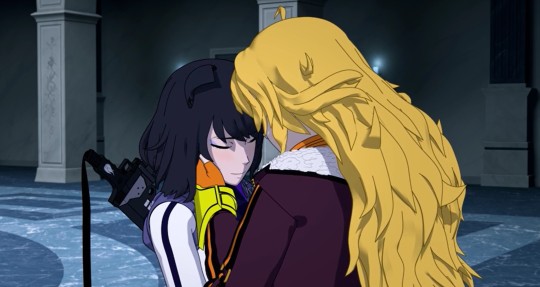
At this point there's nothing more I can say in regards to RWBY's almost-queer baiting. Is touching foreheads more intimate than the hugs Yang gave the others? Absolutely. Is that an appropriate stand-in for overt representation? Absolutely not. This would have been a perfect time for them to kiss. Take out Blake's nonsensical fear and replace it with them both reuniting after their first separation since Volume 5, working under the knowledge that either one could have been killed, finally admitting their feelings. Hell, they don't actually have to kiss. Not all girlfriends are interested in kissing! But they could use the terminology that makes things unequivocally canon. Another forehead touch when we got that in Volume 6? It's not enough, especially not when our straight couples have all been allowed their rep.
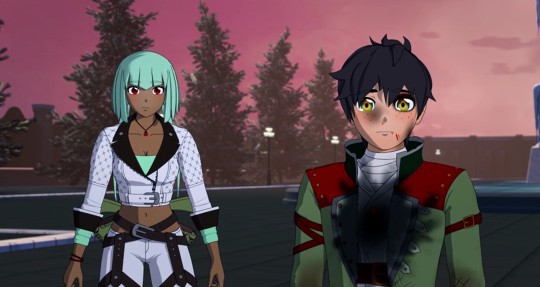
Ren at least wants to know where Nora is. He's presumably told what happened off screen as Oscar tells Ruby that Emerald is their friend now.
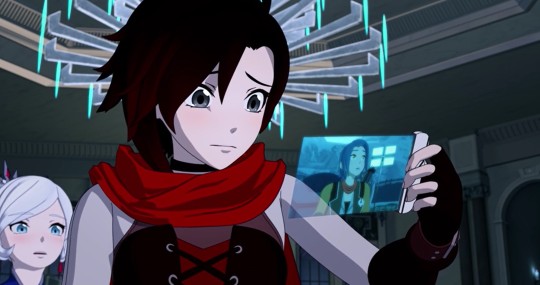
Then an emergency call from May interrupts the reunion and the group learns that Ironwood is bombing the Schnee ships. “Those ships… they were going to save people” Weiss whispers. How? Tell me how they were going to save anyone. Where were you going to take these people where they would be safer than where they are now? RWBY continually asserts things without explaining them, meaning there is precisely zero emotional weight here. Again, Ironwood is far past the point of defense, but I'd be a whole lot more critical of this particular action if I had a better sense of why it's bad. He appears to be endangering the people given May's shout to run — falling debris? — but the further implication is that Ironwood has doomed the people of Mantle by denying them these ships. It's that part that makes no sense based on what we've been told.
Which finally comes to the ultimatum of our episode title: Penny opens the vault, or Ironwood bombs Mantle. Great! So glad this plan is wicked smart and works well for his characterization. It's definitely not a nonsensical, unfounded, overblown change that feels like it belongs in a child's cartoon, complete with dramatic spotlight. Nope. Excellent writing choices all around.
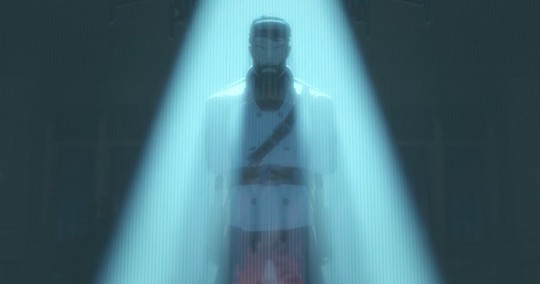
Our final line of the episode is, “I hope you live up to the title I gave you," referring to Penny's job as the Protector of Mantle, and you know what? That line could have been very cool if it was delivered by an Ironwood with a persuasive fall and a halfway decent plan in place. I love that we've twisted the concept of a protector and turned the title into a horrifying, rather than honorable responsibility... I just hate everything surrounding those details.
So, usual RWBY fare.
(At least we get to see that Nora is awake!)
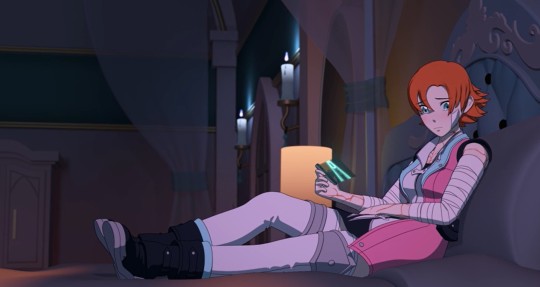
Will things get better over the next four episodes? I doubt it. We're still expecting the rest of the Ace Ops + Winter to ditch Ironwood, someone getting the vault open, the fall of Atlas, now the potential destruction of Mantle, and none of that includes Salem who should reform at any moment. Frankly, I'm not looking forward to any of it. The final leg of a season should make its audience excited to see how everything turns out, not dreading it. I've heard from multiple people that this is the volume that finally got them to drop the show and honestly? I'm not surprised.
As a final (happier?) note: we've finally got a bingo! I completely forgot our board last time, which was a terrible oversight, but we can update it now.
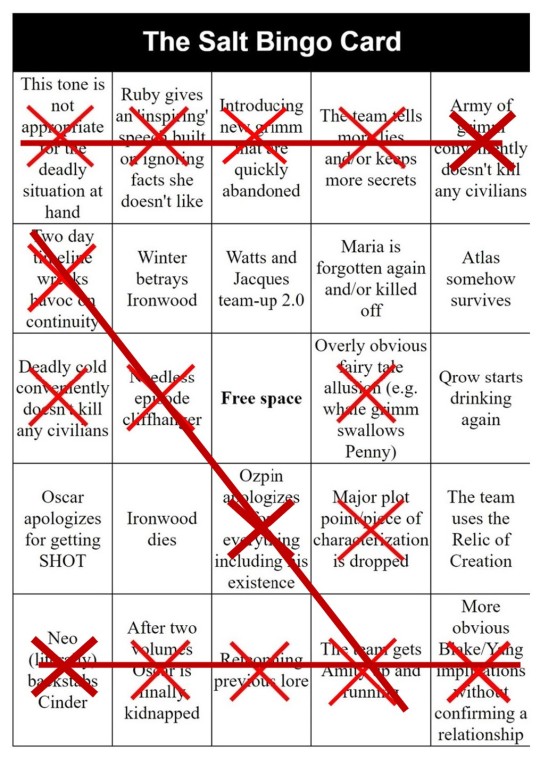
Our army of grimm can't kill anyone now that it got KOed by Oscar (that is the third one hit defeat of a major enemy we've seen this volume. Yes, I'm including the Hound considering it was obviously on its last legs after Ruby's eyes.)
I'm likewise including "Ozpin apologizes for everything including his existence" because he's done nothing but apologize since he came back. The emotion is there even if the literal words are not. Oscar reminded everyone of how untrustworthy he is, but kept the group from jumping them again. And Ozpin thanked him for it.
Neo didn't literally backstab Cinder (shame), but the Relic still counts.
So a triple bingo! Is that how bingo works? Idk, I've never played. I feel like I should have thought up some sort of humorous prize, but sadly I've got nothing. If you think of anything, let me know lol
That’s all then, folks. Until next week! 💜
103 notes
·
View notes
Text
A lil rant
After watching this episode a fourth time and certain scenes a lot and thinking about it a lot I wanted to explain further than I did in the last post.
I focused a lot on explaining the consensual aspect of their first time and explaining the motivation behind Armando's actions as well as Betty's, but didn't elaborate much more, for one like I said I'm an insomniac and was out of it lol, try writing a post for nearly twelve hours and tell me you wouldn't either. I do see that I should probably draft a lot of my "analysis" when I write them because I am not all there so I don't explain things as well so I'll start doing that so the post are a lot more consistent and clear as opposed to me starting with one point and never finishing it. Anyway now that this disclaimer is out of the way here are my thoughts on said episodes as a writer.
Many times when writing we have to revisit our work as we are writing it. This allows us to pick up on certain plot holes and mistakes as well as even figure out some plot twist in the future. Often times when you know your characters and the moral and ending of your story, the story ends up writing itself and forming it's own path. I've mentioned in past posts that the first draft is to write with tears and blood and the when that's over you clean up your crime scene.
Now, all writers are imperfect and we make mistakes, duh, so there's inconsistent things in this show, like the dog, Camila, Beatriz Valencia, etc.. etc.. however when it comes to the main character's personality there really isn't much of a flaw, in fact they are very realistic and consistent, the actors did a phenomenal job bringing said characters to life, one of my all time favorite details of the characters in this show is how they all have ticks. Guti Guti does that thing with his lips, Patricia flips her hair, Betty worries her lips a lot and when she is explaining certain things she often has this really adorable thing where she rocks on her feet and speaks very certain of what she's saying. Armando has so many ticks that it's hard to keep up with them. Point is they all have so many realistic behaviors that it's hard not to notice them and even harder to disregard them as not part of the story when they are. They are a huge part of being able to credit or discredit the motives and actions that move these characters.
For that exact reason Betty's character in the past few episodes was so heavily important to understand where she was coming from. It wasn't just that she was drinking that got her all riled up and excited that night. It wasn't just that she missed him days without him made her longing and desire increase ten fold. There is always a cause and effect.
What caused Betty to behave this way? How did that effect her relationship? What caused Armando to react that way? How did that effect their relationship? Most importantly, how did this affect them both?
There's a clear understanding of who Armando is and what his secret desire and motive is to make Betty fall in love with him. Though his pride and ego are so huge he can't see past it to dissect and understand his feelings aside from the prejudice he has against women who are not the status quota, in the mildest of all of that there lays one true objective: Betty's heart. We mustn't forget that Armando IS worried about Eco Moda and most certainly that he never wants to admit that he was wrong.
However much like a future dream demonstrates it, Eco Moda is just a farce for his feelings towards Betty. Though outwardly he is motivated by the desperate desire to be validated and loved by his parents, to be better than Daniel, and not admit that he was wrong, inwardly what really pushes him and makes him go after Betty is his desire for her.
How does this start off? He blurs the line at work, where things no longer are just professional coming from him. He makes certain achievements of Betty's in her profession and even morale his own, as if they were a team facing the challenges together. He inserts himself into Betty's life and he inserts Betty into his personal life a lot. With his affairs, his feelings regarding the company and his worries. He trust her as his confidant, as his best friend. He trust her with his feelings more than he does with his actual best friend and his fiancé and this all starts days before the plan is even a plan to him.
The cause of this? Betty's faithfulness and unconditionality.
The effect? He feels like he is special to Betty, as he said himself he had been so special with her(If you haven't yet I suggest that you read the posts Nicolas Mora, Un Amigo, Betty, My Betty! Parts 1-3).
As their relationship progressed his feelings continued to grow to the point that this night, not after he slept with her but before he did, he fell in love. It was when Betty was being vulnerable and apologizing to him for having been overbearing that he fell in love.
However Betty had already been in love with him, way before. She knew him in and out. She knew the good and the bad. She accepted him as is and all she wanted to do was give him her affection and love and that's what she's done, it's all she's done and this feeds a cycle of desire and motivation for Armando where her love motivates him to change, it inspires him to be a better version of himself to make Betty happy because seeing her happy makes him happy, it challenges him to change his own prejudice of society and people. She is a safe haven and she achieves that, how wasn't he supposed to fall in love with her this night when she does exactly that?
Betty's cause to behave like this was her conversation with Aura Maria days before where she questioned if Armando felt more for her than just admiration. She questioned if he too desired her. The effect of that conversation was her testing to see if Armando did in fact feel the same way, that he was on the same page.
It is also so satisfying to see the parallels! Oh how wonderful they are!
The extreme contrast between Betty and Marcela are so visible, so vivid, so in your face that you cannot say that Marcela is a victim of Betty's.
I won't defend Betty's actions for involving herself with a man that was in a contract with another woman(I say contract because it was not an engagement. What Marcela and Armando had was a contract, he did her the favor of marrying her and she owned him.) I understand that she is insecure but she was always shown to have morals and ethics above all, where did those go? Out the window that's where. However I still love her so imma be a supportive mother to Betty and call her out but lend her my two shoulders to cry on, okay?
Moving on.
Betty did not and I will repeat this BETTY DID NOT MANIPULATE OR FORCE ARMANDO TO SLEEP WITH HER.
We get two contrast of the exact same scenario for that exact reason people.
Betty and Marcela literally ask the exact same questions to Armando: Am I making you uncomfortable? Am I bothering you? Do you not want to be with me?(Marcela asked Do you want me to leave?)
However they ask it with different intentions and motivation.
Marcela never pays attention to Armando's body language. Instead she focuses solely on herself, her feelings, and what she wants, this is not a person who is insecure, this is not a person who has no self-worth. This is a person who has a huge ego. MARCELA IS SELF-CENTERED AND SELFISH TO THE CORE. For this exact reason she refuses to let go of Armando because she believes that she deserves him not as a human being but as a trophy to satisfy herself that she tamed a man who sluts it out left and right.
This night we get to see that.
While Betty asked him these questions to make sure he was on the same page as her, that he too desired her just as she desired him; Marcela asked these questions to trap him. She wanted to be like "Aha! You do have a lover! Now I'm going to make your life a living hell because I was right!"
No sis, calm your tits, you need a therapist.
While Betty was legit asking for it, for Armando to consent, Marcela was asking for him to satisfy her. There is a huge, and I mean huge difference between asking for consent and wanting to be satisfied.
Ironically my current WIP pushed me down a rabbit hole on information that explains the dynamics of a survivor and a romantic relationship and how to be a supportive S.O and a lot of the articles I read mentioned the importance of intimacy.
What is intimacy? It is forming a friendship with your S.O and establishing honesty and respect. It comes above the physical aspect of the relationship because it makes you feel safe when things are leading to something physical.
Marcela and Armando don't have that. Armando has even told Marcela that he doesn't want her to have his intimacy. When I first saw that scene I was like "Take a look at this an*s! Why is she with him?" and then I saw why... Marcela be blabbering his business to everyone. She tells everyone that Armando is unfaithful(I mean in that aspect he do be deserving that) but it goes so much deeper than that. The reason he cheats on her is because he is trying to escape, have control, and feel validated and then that feeds her possessiveness over him, which then feeds his desire to cheat(@el-moscorrofio-y-el-mercachifle already made a meme about that lol). She never does anything to gain his trust, instead she demands it and when she doesn't get it she has this "Aha! It's because you're a cheating whore and I'll destroy the woman but stay with you because you belong to me you puny little man! But I will also ruin you if you leave me!" Their relationship sucks. It's honestly just a moral enemies to sex trope. That's it. Like there's nothing there.
Which is not the case for Betty and Armando.
They in fact do have intimacy. They talk about their feelings, they face trials together, as a team, they push one another and inspire one another. They were friends(a lil more than friends doe) long before. In the scene where they are talking in the hotel room Betty tells him she understand him, that she understands that he doesn't feel that sort of attraction towards her and just because she loves him he isn't obligated to sleep with her.
I want to repeat this in cause people are still confused or saying Betty forced Armando to sleep with her: She said :YOU ARE NOT UNDER THE OBLIGATION TO HAVE RELATIONS WITH ME JUST BECAUSE I WANT TO.
What does that sound like to you?
Imma wait for crickets.
When Armando then tries to engage into relations she pulls away and tells him that he doesn't have to.
She is literally placing his needs, his feelings, before her own, however Armando has just barely fallen in love and he wants to. He wants to sleep with her. He wants to engage in fornication and sinful actions with Betty.
He gets frustrated when Betty tells him that he doesn't have to and we know it's because he hates it when people, especially Betty, invalidate his feelings or efforts. The fact that Betty now was telling him no upset him because he did want to sleep with her, however he did not pressure her either. He explained why he did want to sleep with her and when she consented and he too consented they sinned.
However later that night we get almost the exact same scenario but with a different tone.
Marcela, after they argued, sits by his bed where he is laying down and goes to take off his tie and tells him that she desires him. Armando was laying still he told her he was tired, wanted to wash up and go to sleep before she did this. He did not look nor welcome her actions, which is different from when Betty told him that she wanted to make him feel better. In that scene Armando asked her how she was going to do that and when she said with her kisses, they both leaned in to kiss. This time Armando just lays there, like all the other times before but he looks at her with a cold stare.
When he jumped back from Betty when they were making out, Betty asked him what was wrong and he expressed himself.
However this time when Marcela asks him her tone is different. This time she's angry at him as she yells at him to deny that he has a lover now.
Marcela wasn't looking to be with her man, she was looking for her man to be with her. She wanted him to prove to her that he hadn't been sluting it out(like how was he supposed to prove that when she been knew that he still went and slept with her after he slept with whomever? Like she knew he did that and she still consented? WHAT? which y'know feeds the notion that she just wanted her socks rocked) but it contradicts what she says the next day to Patsy Pats at the office. Marcela just wanted him to satisfy her. She wasn't looking for it to be team work, she was looking for it to be about her.
This is why that night was so important. These little scenes, movements, play on words and parrales are there to show us two different relationships; a healthy one and a toxic one.
Marcela didn't respect Armando's no, she just had no other option because this time he wasn't just laying there letting her do what she wanted, this time her emotional manipulation didn't work, this time her seggsual manipulation doesn't work so unless she was gonna r-word him than she had no other choice but to be pissed about it.
Betty did respect Armando's no. She tried to explain herself and apologize to him. She even double checked with him when he told her he did want to. Betty was willing to not have relations with Armando if he didn't want to, for the sake of their relationship and what they have, she would not jeopardize their relationship just to get her socks rocked nor would she make him feel guilty for it.
It wasn't a happy little accident that we get these parrales in one episode.
Understanding the cause and effect helps us determine this.
Understanding the character's inner desires and dilemas helps us understand this.
So no, once again, Betty did not force Armando to sleep with her. Everything before, during, and after that scene shows us and tells us this.
We get both a cause and effect with the added bonus of show, not tell.
This novela reads like a book, so there isn't much of a speculation when we are being shown to compare both of these relationships when they are saying the same things, in the same scenario but with different tone and reaction from the character of interest in both scenarios.
The purpose of this novela was to break social norms of how certain women and men are presented in the media and to question why that is. It isn't simply a love story, if it was I wouldn't be able to watch it as stuff like that makes me want to puke, again this is all a funny ironic joke that someone is playing on me.
[EDIT:
Another key things to take into account(I mentioned it in the Forgive Me post) is that even Mario's tactic to manipulate Armando had nothing to do with Eco Moda or his ego. It had everything to do with Betty's feelings and Armando's desire to make her happy. That same day Mario took notice of Armando's behavior towards Betty at the office and the guilt he felt over forgetting her B-day. Mario played with Armando's feelings and he pushed his buttons to see just how much it mattered to Armando.
When Armando said at the bar that he couldn't go through with it, Mario told him he was convinced, a sincere reaction of his, and he didn't have to do it anymore. However when Armando said he couldn't do that to Betty because she was really looking forward to it, Armando was smiling when he was talking about her enthusiasm to spend time with him, and Mario took notice of that.
So again, Armando did want to sleep with Betty, he just didn't want to do it under deceit or manipulation. He didn't want to be Betty's "First" under those conditions and Betty didn't force him.
My rant is over.
[EDIT: On the Forgive Me post I went back and did two corrections, they are in bold so if y'all want to read them, that would be awesome :)]
#don armando#armando mendoza#armando ysblf#betty pinzón solano#beatriz pinzón solano#beatriz pinzon solano#betty ysblf#yo soy betty la fea#morch#marcela ysblf#marcela valencia
43 notes
·
View notes
Text
𝙏𝙝𝙚 𝙉𝙚𝙬𝙨-𝘽𝙚𝙣𝙙𝙚𝙧𝙨

𝙏𝙝𝙚 𝙉𝙚𝙬𝙨-𝘽𝙚𝙣𝙙𝙚𝙧𝙨
Warning: full synopses contain 'spoilers' that give away key plot points. Don't read on if you don't want to know the ending! Robert Larkin, a successful BBC documentary film director, has an appointment with the mysterious 'JG' at the office of CWNS (Classified World News Service). CWNS operates between government and media companies, supplying news footage and stills. After detailing Larkin's career, JG reports on details of his private life, including an affair. He reveals that Larkin had been fitted with a miniature transmitter during a surgical procedure some years earlier, through which he has since been monitored. From this data, CWNS identified Larkin as being suited to working at their organization. Larkin is disbelieving and about to leave until JG plays back a recording of him in a private moment with his mistress. JG tells Larkin that he wants him to help invent new stories for 1973. JG shows Larkin through to a studio containing models and miniature film sets depicting a moon landing, scheduled for 1973. JG plays the film with commentary that they have already recorded. Elsewhere in the studio are models of an orbital weapons system and models and film of the results of a projected Chinese nuclear attack on an Indian border village. Larkin begins to realize that the public will accept the news of such remote objects and incidents of which they would never have had their own experience. Larkin is shocked to learn that the worrying new American Intercontinental Ballistic Missile 'Boy Wonder' is just a model, the story has been set up to capture his attention. JG reveals that deceptions such as these have been going on since the atomic bombing of Hiroshima and that the H bomb does not actually work. Returning to his office, JG explains that the organization thinks Larkin would be suited to working on more 'soft' news items, such as a proposed anti-teenage movement or a religious revival. JG plays a further extract from Larkin's conversation with his mistress to illustrate the qualities the organization admires in him. JG explains that since failures to develop new weapons after the Second World War, the Americans, British, and Russians have collaborated on the deception of the cold war. The Chinese follow a similar strategy and it is hoped they too will come on board. JG goes on to explain that all the crises which could lead to the deployment of these fictitious weapons are also invented and stage-managed. CWNS sits above the civil servants and the military, controlling all. Larkin is angry at this use of scare tactics and JG goes on to explain that it is not just fear but the money they use to control the population, by managing the economy. They can stimulate the economy with threatening news stories, provoking spending. He reveals that his department was also responsible for the development of LSD to counter the activities of protest movements. Larkin is incredulous to learn that higher up in the building, and therefore in the hierarchy of the organization, is a computer. JG offers Larkin a starting salary of £250,000, rising to £1 million once he reaches a position in the Ministry of Morality. Despite this, Larkin remains disgusted at the idea of CWNS and declines the job offer. As Larkin tries to leave, JG uses an example surgical transmitter to demonstrate the devices' explosive properties. He explains that it may be operated remotely. JG informs Larkin that he will be starting on Monday. BBC2's Thirty-Minute Theatre (1965-73) was an attempt to reintroduce live drama to British television at a time when most program-makers had - gratefully - put the method behind them. However, the live element didn't last long, being phased out in favor of the convenience of pre-recording. Even so, a handful of the series' plays remained live until 1968, 'The News-Benders' being one of the last. The News-Benders is directed by Rudolph Cartier, who made his name in the 1950s with ambitious live productions. The story is essentially a two-hander, performed entirely within a handful of sets but, for all its simplicity, Cartier's direction is stylish and assured. The continuity of the action is disturbed only once, with a brief cutaway shot of JG's secretary covering the actors' move from one set into another. The live production method may be backward-looking, but Desmond Lowden's script is prophetic in several respects. Although its predicted date of the moon landing significantly overshoots the reality, it strikingly pre-empts subsequent conspiracy theories which suggested the event was faked in a film studio. It also prophesies the rise of politically powerful global media organizations and the surveillance culture that inspired many later conspiracy dramas. screenonline.org.uk/tv/id/1403399 .
Donald Pleasence: Blythe 'The Forger' in The Great Escape (1963) Ernst Stavro Blofeld in You Only Live Twice (1967) Dr. Sam Loomis in the Halloween (1978)
https://www.youtube.com/watch?v=xYAke_z3RVU

Read the full article
0 notes